#these two individuals be having the most insane character conflict I ever made ‘cause if you see
Explore tagged Tumblr posts
Text
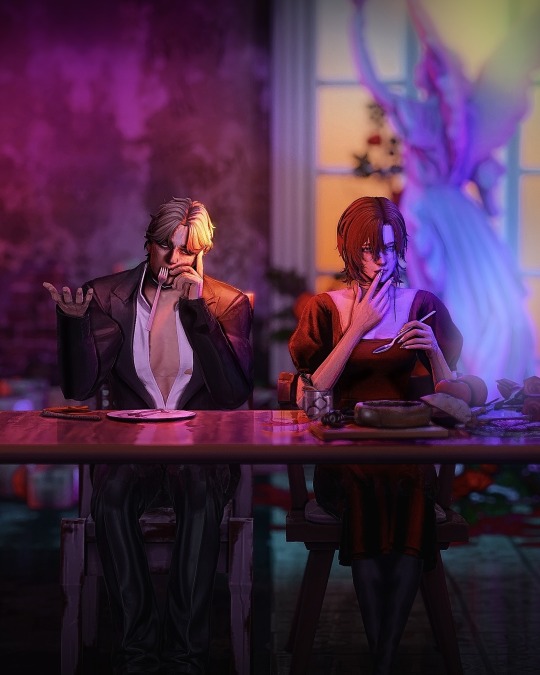
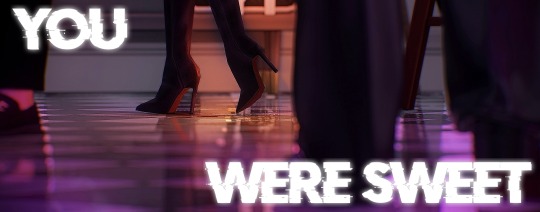
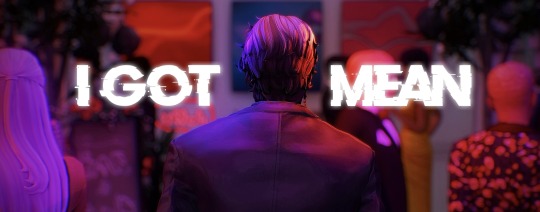
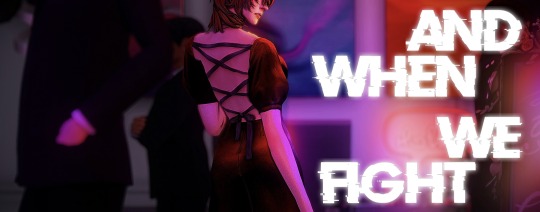

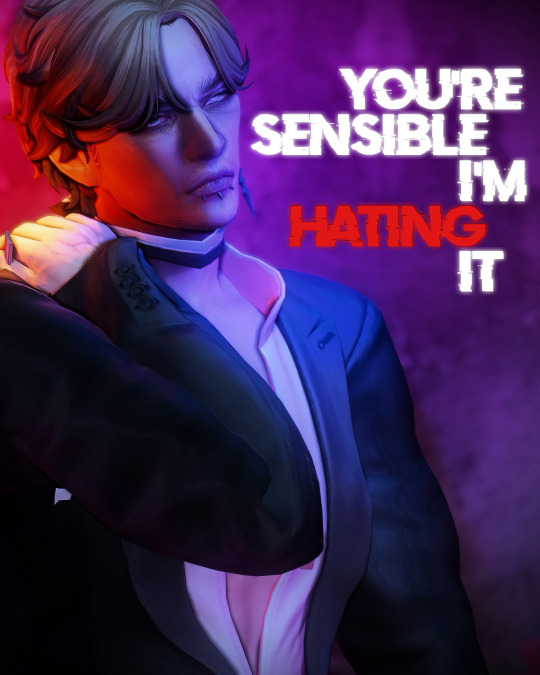
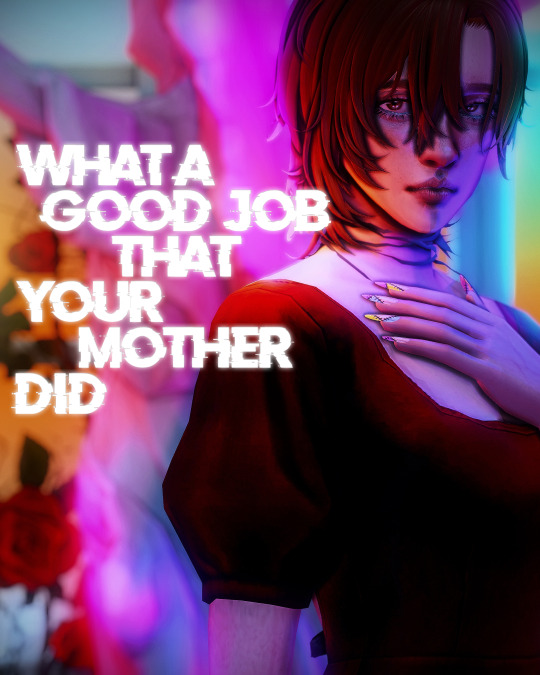
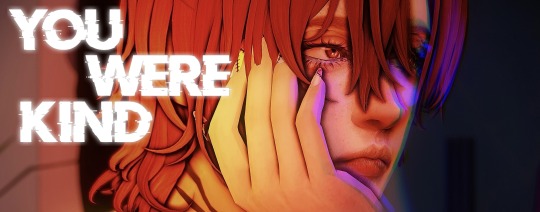
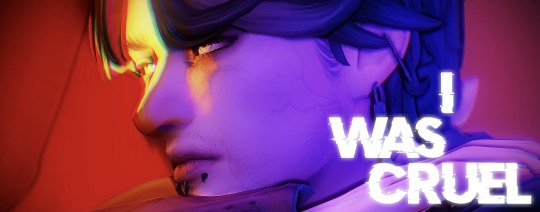
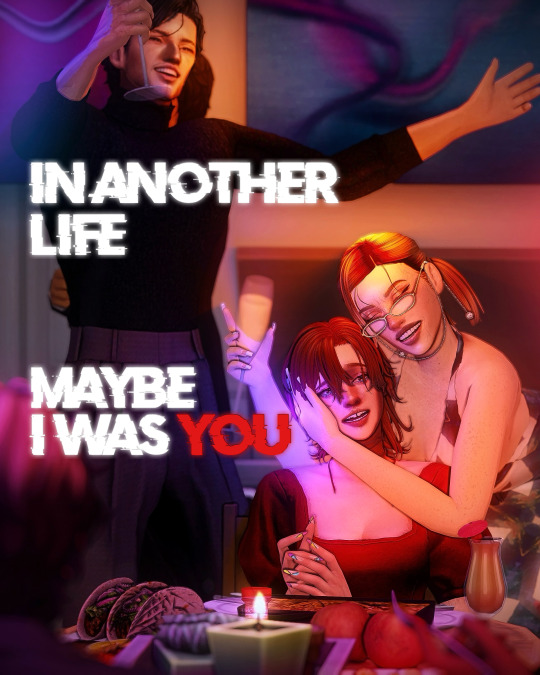
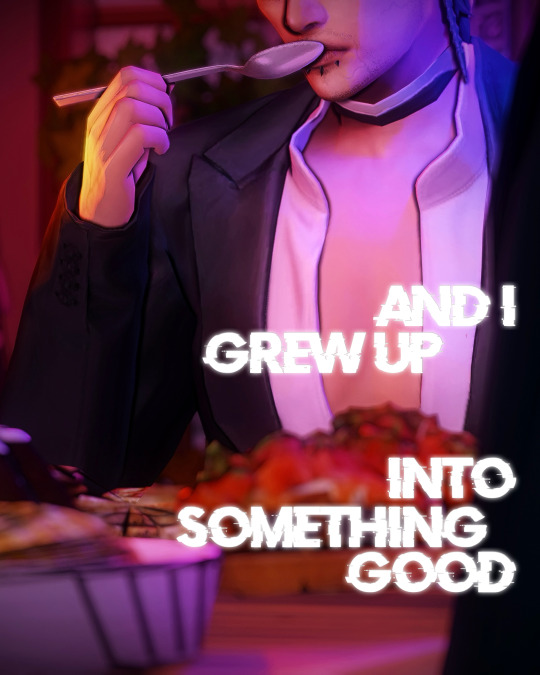
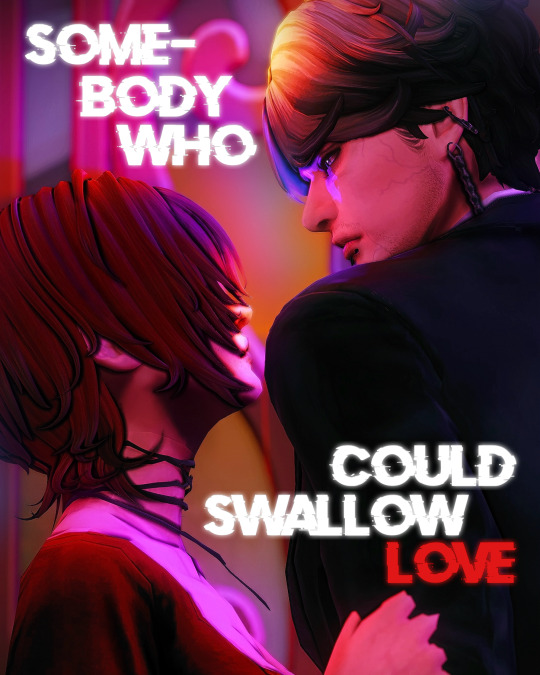
Fed love from silver spoons, reasons to be grateful… 🥄ᯓ★
#your origin#theo wood#fiona frost#so. im losing my mind cuz these lyrics hits too close to home man.#THIS 🗣️ IS 🗣️ THEIR 🗣️ SONG 🗣️ YA 🗣️ HEAR🗣️#heavy on the mother & their differences part RJWGAGA#fav song after famine lane tho.#silver spoon freaking nepobaby gal facing a guy who has a famous father but neglected and yet.#these two individuals be having the most insane character conflict I ever made ‘cause if you see#theo freakin envy fiona-still a future event this post-but ITS FUCKING CRAZY#BUT THIS IS LIKE THE FIRST TIME THEO ACTUALLY DOES NOT KNOW WHAT TO FEEL#uugh.#ts4#sims 4#simblr#my sims#ts4 edit#sims 4 edit#maybe this considers a pre-valentine post no? kinda edgy whats wrong w me
141 notes
·
View notes
Text
Repress Your Feelings, Girl.
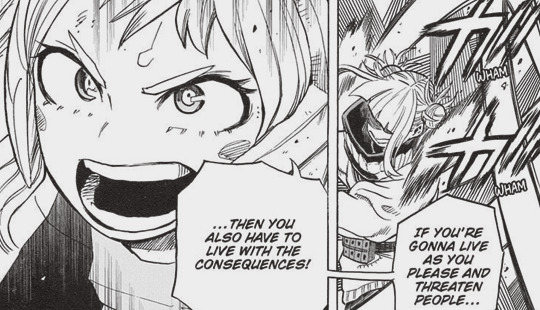
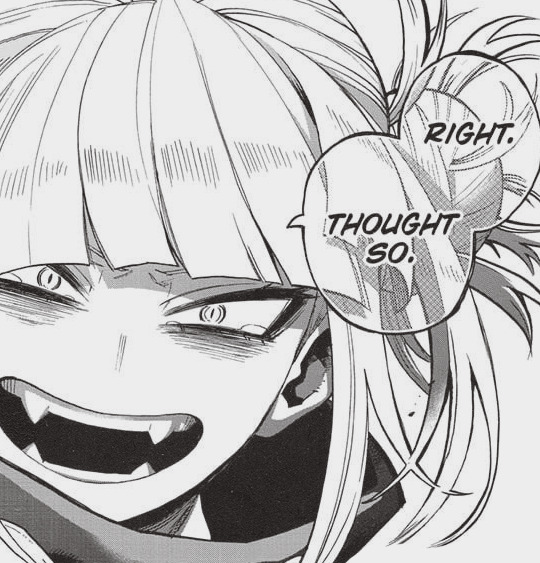
Toga and Uraraka can’t understand each other: because Toga can’t explain herself properly, and Uraraka doesn’t really want to understand. However, there’s also a narrative reason behind why these two characters are fighting each other. It has nothing to do with morality, good or bad, hero or villain, but rather the writing of the characters themselves. Toga Himiko and Uraraka are foils, two sides of the same coin meant to reflect each other. They are essentially (in narrative terms at least) the same person, just both of them expressing different sides of themselves. Uraraka Ochako represses, and Himiko Toga expresses herself, more on their foiling underneath the cut.
Before I start out I just wanted to point out a few of the deliberate paralels the narrative draws between the two characters. First, the girls come from completely opposite circumstances.

Uraraka comes from a poor family, whereas Toga comes from what seems to be a wealthy household, considering there’a a gate in front of their door.

Typically Himiko would be the privileged one, but the narrative inverts this. Uraraka grows up in a household where her identity is affirmed by her parents no matter what. Himiko grows up in a household where she is constantly told she is wrong by her parents.


Ochako is continually accepted for who she is, and Toga is told not to be herself, not only suffering parental abuse, but also psychiatric abuse on top of that.
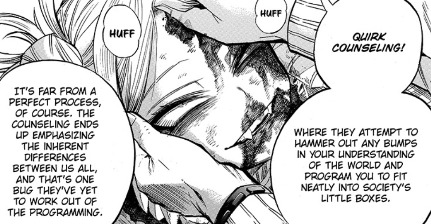
One more way in which they are opposites, Ochako is someone who tends to be sheltered (her parents did her best to hide the fact they were suffering from her because she didn’t want her to feel guitly about it, however it produced the opposite effect, Uraraka got better at reading the faces of people and noticing their suffering.)
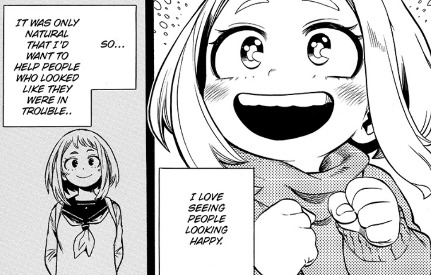
Himiko on the other hand has grown up very unsheltered, she’s been on her own since middle school. There’s several hints she’s been exposed to the ugliest side of people already and spends her life running away from them and keeping herself safe from them.
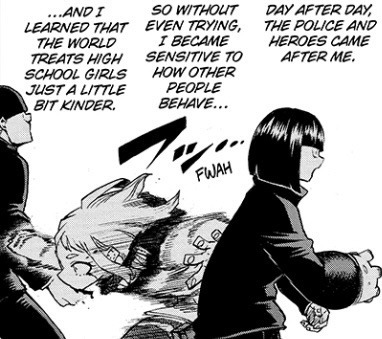
Himiko and Uraraka are both incredibly good at reading other people, but they developed this ability for opposite reasons. Uraraka who was sheltered noticed the pain her parents tried to hide from her and developed it compassionately, and Himiko who has been on the run for most of her life developed it as a method of survival. However, that doesn’t mean that Himiko is lacking compassion, or Uraraka always empathizes with everyone she meets, because both of them are complex individuals.
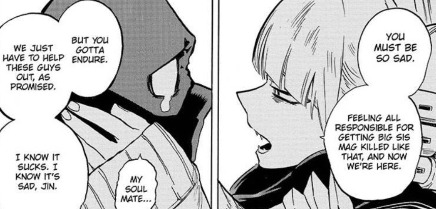
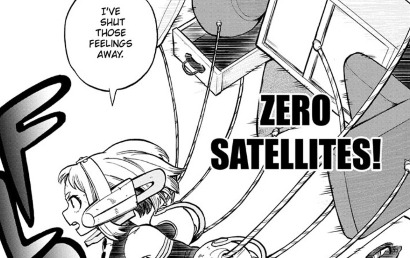
Himiko is capable of empathizing with other people, not only that but she’s grown significantly out of her shell and learned that other people besides her have needs, feelings she needs to take care of, to the point where she’s stopped prioritizing herself first in all circumstances. On the other hand, Uraraka is just as capable of shutting her feelings down and ignoring the viewpoints of other people she finds disagreeable with her own.

Uraraka and Toga are also both extremely social people, however all of Uraraka’s friends accept her for who she is. Deku knows Uraraka so well that he can tell when Toga, pretending to be Camie, is the one replacing her. Toga is someone who like Uraraka was always at the center of a group of friends tying her together. However, Toga could only present her fake self in front of them.
1. The Repressed

Jung divides the self into three, the shadow, the persona, and then the ego (self) which is made of a combination of the former too.
Persona
The persona is how we present ourselves to the world. The word "persona" is derived from a Latin word that literally means "mask." It is not a literal mask, however.
The persona represents all of the different social masks that we wear among various groups and situations. It acts to shield the ego from negative images. According to Jung, the persona may appear in dreams and take different forms. [source]
Shadow
The shadow is an archetype that consists of the sex and life instincts. The shadow exists as part of the unconscious mind and is composed of repressed ideas, weaknesses, desires, instincts, and shortcomings.
The shadow forms out of our attempts to adapt to cultural norms and expectations. It is this archetype that contains all of the things that are unacceptable not only to society, but also to one's own personal morals and values. [source]
My Hero Academia uses Jungian Symbolism, especially in regards to Himiko and Uraraka’s characters, this isn’t something I made up it’s directly in the text. Toga’s act of repression is literally called: wearing a mask.

Toga and Uraraka are written to contrast each other on which part of themselves they present to the world. Uraraka is extremely conscious of other people’s expectations of her, so she plays up her persona. Uraraka is someone who is always putting up a show for others because she knows how they perceive her.
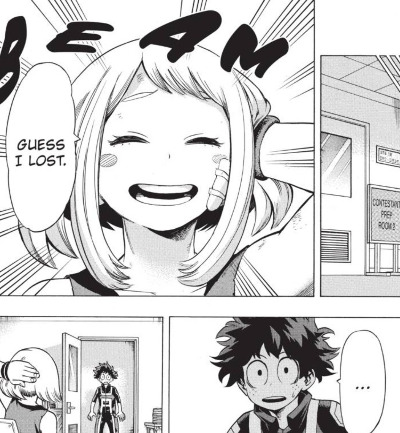
Her own perceptiveness works against her, because while she loves seeing people happy the most she also can’t stand to see them in pain, or even be the reason why they’re in pain. Uraraka’s solution to this is a rather immature one, she believes if she’s good all the time, if she’s always this pleasant and happy person and never shares her problems then she won’t drag the mood down.
Uraraka is conflict avoidant in other words. There are times she directly addresses the conflict like the times with Tsuyu, but even then it’s in a “We should all get along as friends” sort of way. Uraraka always pushes her feelings down and tries her hardest never to cause trouble for others. However there’s a line between trying not to hurt others, and simply pretending the conflict does not exist.
The shadow is the part of ourselves we repress in order to play for other’s expectations. The persona is a performance, it’s the personality you perform every day. You would swear with a group of friends, but you wouldn’t swear in front of your grandparents. People hide parts of themselves depending on who they’re interacting with, personality is in part a performance to the expectations of others around you, that’s natural. Everyone will have a side of themselves they show to others, and a side of themselves they keep repressed. That’s natural. What is not natural is to be all one way or all the other.
‘Man is not truly one, but truly two’ “Dr. Jekyll and Mr. Hyde.”
The point of the shadow and the persona, is that both are true at the same time. You are both who you pretend to be, and what you hide of yourself. The persona is not fake just because it’s a performance, and the shadow isn’t the true self or all there is to you just because it’s hidden. However, the opposite is true at the same time, the persona is not all of who you are, and you can’t make your shadow go away just by repressing it.
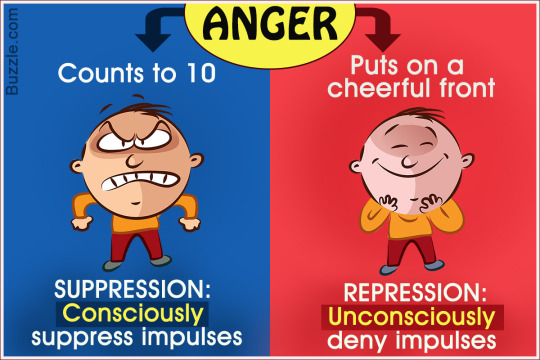
Psychological repression is not a healthy strategy for dealing with emotions. It doesn’t resolve emotions, it just makes them go away for a short time. One response to the presence of a shadow is to simply ignore it, but ignoring it will just make you ignorant.

Uraraka views herself to be a good person, and views heroes to be good, but that belief hasn’t come from confronting the bad of society and deciding that heroes are still good anyway. Which is my point, not that Uraraka is wrong, but that she’s ignorant. She’s sheltered, naive, and her lived experience is so narrow she can’t realy make a judgement call on Toga that’s accurate. Like, just for exmaple heroes do in fact kill people. They even get excited about completely destroying villains.
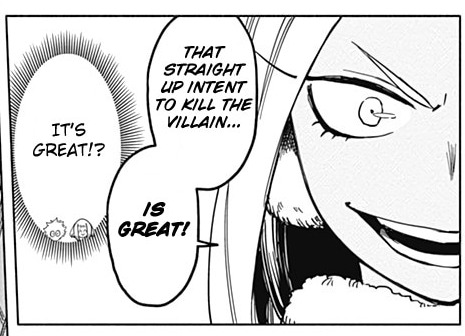

There are heroes who become heroes just to beat the shit out of villains, there are heroes who will try to kill villains, Tokoyami gets confronted with the fact that Hawks killed a villain and his first response is: You did nothing wrong, Hawks. Uraraka sees heroes as the ideal only ever saving people. Yes heroes save people. There are other heroes who are violent. It’s not one or the other, the truth requires acknowledging both at once. Uraraka’s point that she would never feel happy about violence is a false one, because she doesn’t know that for one, and two heroes are just as capable of violence as villains.
The key point to repression is that it doesn’t work.

Himiko already tried reperssing herself and it just drove her insane. The feelings don’t go away simply by pretending that they are not there. Even in a narrative sense, Uraraka’s shadow that she has repressed has escaped her in the form of Himiko and is running around constantly trying to challenge her and confront her to get her to acknowledge those feelings. The feelings will not go away, and Uraraka’s solution is to just keep putting a lid on them and pretending they are not there. It’s because she has such a tight lid on herself it makes her impossible to see things from Himiko’s point of view.
Why is Uraraka supposed to understand things from Himiko’s point of view? Because Himiko is Uraraka, she’s all of her repressed flaws come to roost. Uraraka cannot change or improve as a person until she accepts both the best and worst of herself instead of just trying to always be good all the time. Understanding Himiko leads to a more gray and nuanced understanding of reality rather than the black and white: heroes good, villains bad. Himiko is a foil, a narrative device used to show the flaws of another character.
Uraraka did nothing wrong / Uraraka is right.
Well okay then, but Uraraka would be a pretty boring character otherwise. She’d just be a good girl who did good things all the time and always tried her hardest. I’m not trying to insinuate Uraraka is a bad person, I’m arguing in favor of her complexity. I think there is more to her character than just her trying to be a better hero, and getting stronger and learning to use her powers better. There’s an emotional complexity to Uraraka that she represses.
Emotionally, Uraraka is similiar to Himiko because they both cope poorly in the same way. Emotional repression is unhealthy. Himiko has only two modes, repress everything or don’t repress anything and both of those extremes are bad. Uraraka is on the path to becoming Himiko, because the only way she knows how to deal with things is to shut her feelings off and as Himiko said that doesn’t work: it just drove Himiko insane.
2. The Expressed
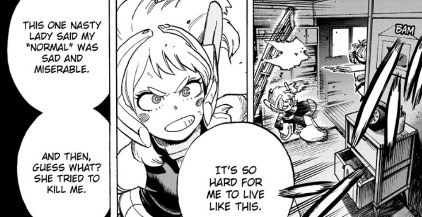
Himiko Toga is who she is in reaction to her trauma. Uraraka pushes herself down and tries to play to the expectations of others, and Toga asserts herself and tries to defy other people’s expectations.
I’m actually going to blow everybody’s minds here though: Toga doesn’t actually want to murder people and suck their blood dry. It’s what she thinks she wants, but once again, she is who she is, in reaction to trauma. Toga was violently abused, Toga became violent, but it’s not who she is inherently. It’s who she thinks she is.


Toga has internalize every bad thing every person has ever said about her. Toga not only foils Uraraka, she also foils Shigaraki. Toga has been convinced, that what she wants naturally, is to suck people’s blood, and kill them. The same way that Shigaraki has been convinced by AFO that he was naturally born with the urge to destroy others.

These aren’t things that they have a natural inclination or desire to do, it was things they were told about themselves repeatedly. Shigaraki by AFO, and Toga by everyone around her. Even Toga’s initial incident of violence has a lot more in common with a psychotic break, then with you know, a pre-meditated murder that she did for pleasure.
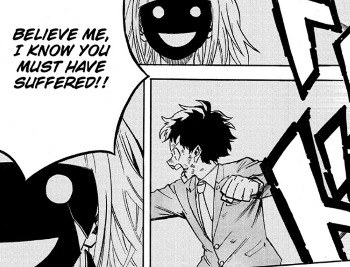
It’s not something Toga naturally did on her own, it was something she was pushed to do. Remember, Toga suffered twofold abuse. Abuse from her parents, but also psychiatric abuse. The people who were supposed to help her reconcile her quirk, and her unnatural tendencies didn’t try to heal her like they were supposed to. She was demonized by everyone around her, told what a bad girl she was constantly, not for anything she did wrong but because she was born naturally with a quirk. She tried to be good and smile for the sake of others, untils he reached a breaking point: then and only then did she lash out.
Toga’s initial instant of violent wasn’t a pleasure killing. It was a lashing out due to a psychotic break, and it was because both of the systems in her life that were supposed to help teach her to learn to deal with emotions, quirk counselling this world’s version of child therapists, and her own parents, chose to demonize her and tell her to repress herself.
However, children who are abused tend to internalize the words their abusers tell them. Children who are abused often believe they “deserve” their abuse because of their bad behavior.
Now, I’m not trying to justify. I don’t think Toga Himiko is allowed to run around killing whoever she wants just because she was abused. My intent is to explain how her brain works.
Toga Himiko doesn’t get to lash out as she pleased, but I think it’s important to understand that Toga’s lashing out is what makes her human. She’s not an inhuman monster, she’s a human reacting to circumstances. Most people exposed to ugly situations, react in ugly ways, and the few that don’t are the exception that proves the rule.
My point being that Toga is not an insane monster that lusts for blood, she just believes herself to be one. The same way that Uraraka is wrong, Toga is also wrong at the same time.
Because as I said the above is right. Toga can’t live her life just lashing out. While it’s understandable, someone who has endured violence can’t keep lashing out violently forever. Toga’s choice to always lash out is just as unhealthy as Uraraka’s choice to always repress herself.
Because Toga relies again and again on violence to vent her feelings, violence has become an inescapable part of her life. It’s also contrary to what she really wants. Toga thinks she wants violence, but the violence is just a reaction to the violent abuse.
Yes, Toga says all she wants is to drain people dry of their blood but characters are liars sometimes.
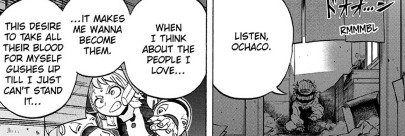
Sometimes you can’t take a character at their word. Sometimes instead of reading something directly as stated line for line in the story you have to read between the lines. Toga says she wants to just kill people, but her internal thoughts contradict her.
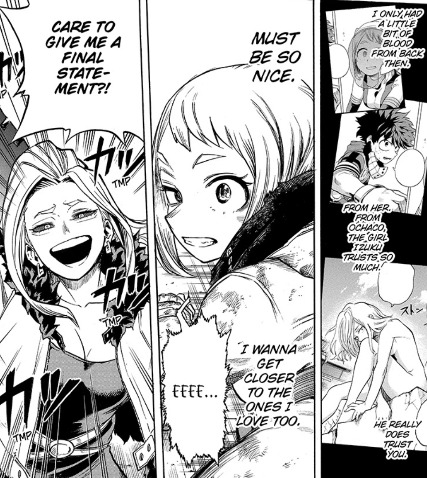
What Toga needs is to be accepted, loved, and trusted like Uraraka is. That’s her deep internal desire that she states to herself when pushed to her absolute edge by Curious. What Toga thinks she wants is to drain the people she wants dry of their blood, so she can become them and live vicariously through them. What she thinks she wants is a life where she can do whatever she wants, and do as she pleases, in response to a life where she wasn’t allowed to do anything that she wanted. But, that again is a child’s idea of rebellion. It’s a response to her abuse, it’s not who she is. However, Toga’s personal development was forwarded not by killing people and draining them, but by the empathy and acceptance she showed towards Jin.
There’s what she needs, what helps her develop into a more stable person, the empathy and care she shows to Jin. The acceptance Jin showed her in return.
There’s what she thinks she wants, which is to just rebel against everything and always do what she wants in every single situation and accept no limitations on her personal desires.
Toga is in fact just a normal girl, who wants to be accepted by the society at large, or at least find people who accept her. However, Toga doesn’t see herself as one, because she’s internalzied the idea that she’s the blood thirsty monster that everyone thinks she is. Which is why Toga contradicts herself.
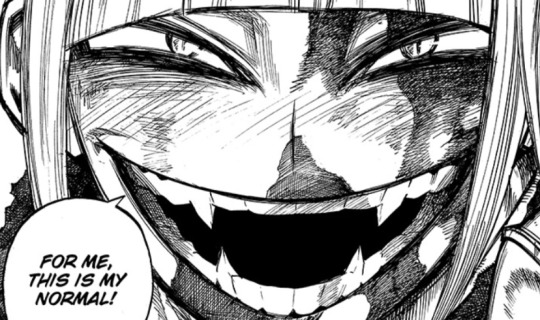

Toga in the same breath will say “I’m also a normal girl” and then “I’m a weird kid, I’m a weirdo, no one can understand me.”
Toga cannot explain herself, because she’s wrong about herself. She’s making herself out to be a violent monster because that’s how she copes, the really really bad way she copes. It’s easier to be a violent monster, she’s more protected that way, then to be a runaway girl who’s just scared and alone. However, because Himiko can’t admit this, she also can’t explain herself to other people. She presents the monstrous version of herself and that’s all Uraraka can see.
Neither Uraraka nor Himiko’s way of coping is sustainable. Uraraka cannot keep repressing herself forever, the same way Himiko cannot violently lash out forever.

While what Uraraka says is very black and white, it’s not wrong. If HImiko is goign to live her life “Kill or Be Killed”, then she’s just as likely to end up being killed then she is to be the killer. There’s no happy ending to that kind of life.
However, there is no happy ending to Uraraka’s way of living either. Her perfectionist tendencies and her desire to only ever be good just aren’t going to work, because one a lot of bad things are going on already Uraraka just doesn’t see them, and two it’s not sustainable, Himiko was someone who held everything in too and look where that got her.
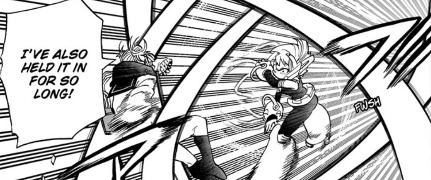
Uraraka and Himiko’s talk failed because neither of them are capable of communicating right now. Uraraka can’t understand because she doesn’t try, and Himiko can’t explain herself because she also doesn’t try.
Uraraka only sees what’s good about the world, about heroes. Himiko only sees what’s bad about the world, about heroes. Uraraka sees the beautiful parts, Himiko embodies the ugliness.
However they are both wrong because they are both short sighted. People are not just their shadows, and they’re not just their personas. They are both at the same time.
A junagian shadow confrontation doesn’t end in a fight between good or evil. The shadow is not evil, the persona is not good. They are just two halves of the same person. Defeating a shadow does not make it go away. The shadow is something you have to learn to live with, the same way everybody on earth is flawed, and just tries to live every day working on their flaws the best they can.
The shadow is something that has to be reconciled. Uraraka and Toga don’t have to defeat each other, they have to reconcile with one another.
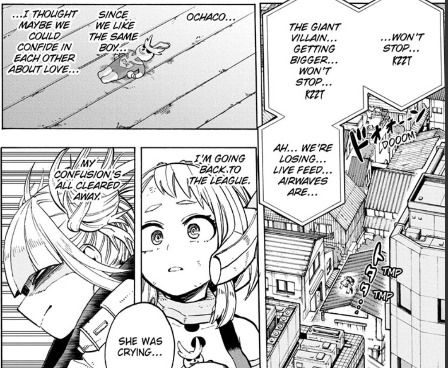
The narrative is pushing their reconciliaton because Toga and Uraraka both have what the other needs to grow. Uraraka is ignorant because she’s lacking experience. She hasn’t lived Toga’s experiences so she doesn’t understand her perspective. She doesn’t know, and she won’t know until someone explains it to her. However, saving as many people as possible means that Uraraka should also be open to trying to save people who react to abuse in ugly ways as well, because a person can be a victim and a villain at the same time. Uraraka will be a better hero if she’s able to see the flaws in her own society, because she’s a part of the next generation to reform society.
And Toga can’t become someone who is trusted by others if she’s violently lashing out all the time. The same way that Uraraka needs to see what’s bad about the world, Toga needs to learn to see what’s good about the world. The same way Uraraka needs to see both sides of the world, that of a villain girl and that of a normal girl. Toga needs to come to terms with herself, that she’s not a violent monster, but a normal girl. The only way she can stop lashing out and start actually taking responsibility for what she’s done and start on the path to self improvement is if she starts seeing herself as a person capable of improving.
Toga wasn’t born this way she was made this way. She’s just a people, and people change. Toga can either try to change, or keep lashing out forever but at the moment she doesn’t even know that changing is an option for her. She thinks she’s going to be stuck as a monster forever because she was just born one. That’s why, Toga also needs Uraraka as much as Uraraka needs her.
#togachako#uraraka ochako#ochako uraraka#himiko toga#toga himiko#lov meta#mha meta#league of villains meta#my hero academia meta#league of villains#toga himiko is a terrible person#yeah but she's fascinating#besides it's not like she killed YOUR MOM#she hasn't hurt anybody in reality#she's a character in a narrative and we can analyze her without the need to moralize her#because obviously killing is bad#but like beyond that it's constructive to look at her and try to understand her as a person
318 notes
·
View notes
Text
The Tell-Tale Heart of Clay Jensen
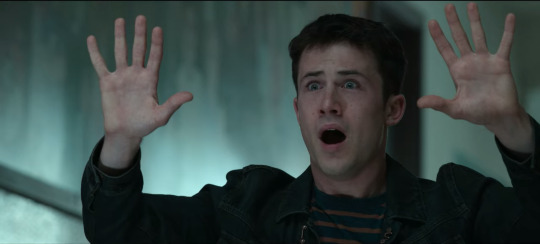
From its inception to its release, 13RW created quite a whirlwind in the media over allegations that it causes suicide and is insensitive to these issues. Now, at its end, it feels like 13RW has long said goodbye to those times and has embraced the blunt nature with which it discusses teen issues of suicide, abortion, drug abuse, sexual abuse and gun violence. I have always appreciated that the show took these issues head on and did not back down from a fight even when the media and parents were hell-bent on ruining its legacy.
Season 4 of 13RW comes at a time where we’re all feeling slightly disconcerted and apprehensive of the future what with a deadly virus at large. I’m sure we all must be feeling trapped not only in our homes, but in our own idle and terrified minds with no room for escape, because there is nowhere to escape. Surprisingly enough that is exactly how Clay feels throughout this whole season. Basically, Season 4 has two goals: to mentally push Clay to the metaphorical cliff’s edge and to wrap all the complex and messy emotions in a 5 minute valedictorian speech. The former I was mildly intrigued to explore, the latter I was not impressed with. Let’s take a closer look at what the show has achieved or failed to achieve in its final season.
Those who know Clay’s character well, know that he’s the sweet guy-next-door who just goes with the flow rarely stopping to question his sometimes irrational actions and poorly-made choices. Like, when he chose to point a gun at Bryce or when he chose to cover up Bryce’s murder. Having been in jail, becoming so involved with the deaths of 2 close friends (Jeff and Hannah) and covering up a murder, it was only a matter of time before he roller-coastered straight into the deep end. There’s only so much one person can take before they crash and burn. Quite literally in this season, because as we see Clay is haunted by dreams of a terrifying Monty, blood everywhere and Bryce. Even the lighting of this season is dark and monochromatic to reflect Clay’s weakened mental state. To be honest, Clay’s go-with-the-flow nature is the source of his mental distress, because for the past few seasons, he has just been coasting along with the other characters never stopping to think that maybe his friends are wrong and that he shouldn’t go along with the choices they’re making. Of course, at the same time, this quality is Clay’s core characteristic, because he is known for being a loyal friend even if being loyal means jeopardizing his own life and health.
To put it simply, the Clay this season is a Clay that has lost all sense of purpose. If you’re thinking, what was his purpose anyway? Well, isn’t it obvious? Season 4 Clay has no one to take care of anymore: no Hannah, no Jeff, no Justin, no Skye, no Tyler, no Ani. He lost Hannah in season 1 where he realized he never did enough to care for her. That’s strike one. He loses Skye in Season 2 after they realize their relationship isn’t healthy, because Clay just wanted to stop her from committing suicide. Strike two. He finds Ani in Season 3 only to lose her in Season 4, because she’s already well-sorted and doesn’t need Clay’s help. That’s strike three. There seems to be a method to his pain where he keeps trying to help girls only to realize that he wasn’t helping them in the right way or that they never needed him. Imagine building up this pain of realizing that the one thing you want to do (care for others) is the one thing that you keep failing at. In fact, in season 4, in the lockdown episode, he questions whether he ever even helped Tyler get through his trauma. Clay’s conflict revolves around the fact that he believes that he was never capable of helping anyone and that makes him feel helpless. And it all starts with Hannah. So, in season 4, when he is left with no one to take care of, he struggles through his own emotionally turbulent journey to discover that before he can help others, he needs to help the most important person in his life: himself. It’s clear that throughout the seasons, Clay has been so involved in solving other people’s problems that he fails to solve his own. Which is why Season 4 had to be about Clay finally getting a chance to breathe and take care of himself. After all, if there is one thing this show has taught us, it is to take care of those around you. And that kind of caring starts only when you take care of yourself. Because, self-care is the essential ingredient in the recipe of life.
Now, I have to admit: Though it was difficult for me to watch innocent and good Clay doing drugs, having sex, crashing cars, starting protests, burning a car, yelling at principals, and starting fights, it was necessary to have this character grow in this way. He had to venture out of his comfort zone and become crazy in order to realize what truly mattered to him and how to reach his fulfilled self. Of course, this kind of character arc is nothing new. We’ve seen it play out for centuries in popular texts, short stories and famous literature (Hamlet anyone?). In fact, one popular short story that comes to mind is Edgar Allen Poe’s “The Tell-Tale Heart.” Now, you might be wondering wait what? But, if you look closely, Clay’s spiral towards insanity closely charts that of the protagonist in Poe’s story. Let’s call him Joe.
If you’re a reader of popular literature or have studied English literature, then you had to have encountered Poe’s famous short story, “The Tell-tale Heart.” It basically chronicles the living and breathing nature of guilt which can cause an individual to sabotage themselves. Literally, Joe plots and commits a carefully-planned murder only to have guilt rat him out. In the story, Joe has the police visit him after he commits the murder to investigate his house. After they find nothing, he invites them to stay a little longer and entertains them. He is so confident that he won’t be found that he continues to entertain them knowing that a dead body lies in his room. The guilt of knowing that he stopped someone’s heartbeat makes his heart beat louder and louder with guilt until he cannot take it anymore and he confesses to his crime. Why? Because guilt drives him up the wall and right back down to reveal the dead body parts stashed in his floorboard. Poe very smartly shows how after committing an ill-fated act, guilt leads you to second-guess yourself. Guilt throws suspicion over every small detail until the end result is that you sabotage yourself. And that’s exactly what happens to Clay. The resemblance between Clay’s story and Joe’s is uncanny. It’s almost like the writers of the show wrote Clay’s journey towards insanity with Poe’s story in mind.
Fare warning: Tread with care, spoilers ahead.
Those who have watched the show know that the threatening phone calls, the graffiti (”Monty was framed”), the disabling of the security cameras and the senior camping trip prank was all dissociative-Clay’s doing. It’s a real mind-blowing scene when it hits Clay that he was the one sabotaging himself. The guilt of covering up Bryce’s murder was slowly killing him from the inside just like it was for Joe. It was like there was a part of Clay that did not want to stay quiet about the coverup and wanted the world to know what had happened exactly like Joe. Joe also could not take the fact that he got away with the murder and had to reveal his true colors. It’s something to think of that guilt can eat so much of your mind and soul that you become suspicious of everyone around you. Clay suspects almost every character (Winston, Diego, Charlie, Estella and even Tyler). His guilt actually turns out to be so murderous that it makes him do all sorts of crazy things that he would never do like start protests and yell at the principal. Now, 13 Reasons Why takes it a step further from Poe’s story by having Clay dissociate, so obviously there’s not too much damage control to do at the end (very convenient). Still, it is something to ponder on: that guilt is such a monstrous beast it can make one sabotage themselves. After all, there’s nothing more mentally and emotionally terrorizing than living with the fear of getting caught. Clay lives and sleeps (barely) with his guilt, never being able to escape it. And that’s why, it’s just easy to let it all out like Joe does at the end of the story. BUT, the major difference in 13RW is that Clay somehow finds a way to circumvent his guilt by justifying his choice of covering up a murder. By the end, he realizes that caring about his friends makes him who he is. With that logic, he comes to the conclusion that if he does something for his friends, then that is naturally right (even if that means killing someone and framing someone else for their murder, apparently). Look, it’s great that he finally understands who he is and what motivates him to behave in a certain way. Basically, losing himself helps him find his right and wrong. But, at the end of the day, morality has to be guided by more than your personal moral compass. It has to follow through with the laws set by society and killing and framing someone is just unjust and illegal no matter who those people are. You cannot justify your actions by saying that “they deserved to die” which, by the way, is what Jessica continues to do. I don’t know on what planet this kind of mentality is healthy, but I guess whatever planet that is, 13RW seems to exist on that sphere because it just ignores the injustice of what these characters chose to do. Yeah, all of them have to come to terms with their guilt, but they also have to realize that living a life carrying this secret is more burdensome than just coming out and saying it. I mean this kind of cover-up will never stop haunting them and they may never be able to move on from the past if they don’t let their guilt scream out from the rooftops. That’s where I think Poe’s story is the winner, because it realizes that you can’t let the guilt eat you up. Guilt exists for a reason so that those who commit crimes are eventually found out. Catharsis exists in letting the guilt shout from the rooftops.
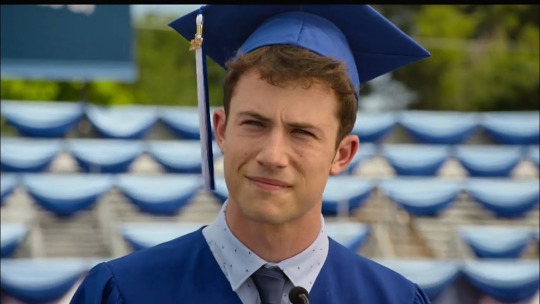
Unfortunately, though Clay exhibits all the signs of self-sabotage and guilt, he chooses not come out with the truth of his actions and those of his friend’s. According to Poe and me, the confession should have been the ultimate resolution to Clay’s arc. Clay shouldn’t have to suffer through the guilt in order to cover up for his friend’s mistakes. However, Clay’s suffering at the hands of his friends doesn’t matter, because the show chooses to neatly tie up the messy crimes and the horrible mistakes these characters committed in a 3 minute valedictorian speech. A speech which ultimately avows that love and acceptance is key to survival. Though that’s true, let’s be honest, it’s just an easy way to brush off the severity of Alex, Jessica, Ani, Clay, Justin, Charlie, Tyler and Zach‘s mistakes. If love and acceptance was key to survival, then we must put forth the question of whether Jessica, Clay and the rest of the characters have actually forgiven Bryce and Monty for their ill-deeds? Did they accept and understand Bryce when he needed to be? What’s lacking here is that though the characters might have accepted their mistakes in the last episode of the season, it still does not mean that they should not have to pay for their mistakes. Clearly, the show lets them get off easy, because even the police officers involved in the case cover up the truth about Bryce’s killer. Now, i’m going to sidestep here to say that I will acknowledge that the show does try to have the characters confess their guilt in a way so that there can be self-acceptance. Like, when Alex confesses to Winston in detail about why and how he killed Bryce. But, still: What message does this send to viewers? That if you have connections with powerful people you can get away with anything as long as you show regret and guilt for your actions? Regardless of whether or not it is a mistake or whether or not you are sorry for it, no crime should go unpunished and unconfessed. And I think the adults more than anyone have a huge hand in ensuring that the truth about Bryce’s murder never comes out. That being said, I’m not defending Bryce’s character in any way or saying that he was always a good person, but he was a human being regardless of the horrible crimes he committed. He does not deserve to have the truth of his murder hidden. The show seriously makes a huge mistake by having characters like Winston and the police officers decide whether or not they should let the truth of Bryce’s murder come out.
Though it is the characters that covered up a serious crime, it’s the show that pulls off the biggest cover up of all: it attempts to dismiss its characters mistakes by excusing it as something that should just be understood and accepted rather than confessed. The show values understanding and acceptance over having the truth come out. Of course, understanding and acceptance of your guilt and your mistakes is a huge part of moving on, but confession is the final step to ensuring that these characters do not suffer a life filled with mental agony and despair. I know it seems that Clay’s journey into mental darkness was resolved with some therapy, understanding and self-reflection, we all know that covering up a murder is not a small crime and will eventually become unbearably taxing to the soul like it did for Joe. As Poe very neatly shows in his story, letting the truth come out about your past mistakes and crimes is the only road to living a mentally stable life filled with acceptance, forgiveness and understanding. After all, confession is not only good for the soul, but also for the mind.
#13 reasons 4#13 reasons why#clay'smentalstate#tell-taleheart#clay jensen#spiraling out of control#dark clay#bryce murder#montywasframed#violent protests#trauma#edgar allen poe#bryce#monty#coverup#truth#confession#Netflix review#netflix shows#netflix#netflixand chill
19 notes
·
View notes
Note
Someone made a really good post on reddit about Rwby's lack of agency and how that ties to the adult characters. The jist of it is that possibly the writers and everyone else thinks that rwby's lack of agency from the later volumes is because they keep following orders from the adults so getting rid of the adults = rwby gaining their agency back. The post argues that their lack of agency stems from their lack of motivation.
I absolutely agree with that last bit. We really haven’t heard anything about their personal motivations since Mountain Glenn and what little we do know is often contrary to them choosing to join this fight, let alone acting like that’s an obvoius choice for them:
Ruby is generically a Good Person™ but that just isn’t enough to go on given the new stakes and the emphasis on realistic repercussions/ethics. If Ruby is human enough (as opposed to fantasy-hero-protagonist enough) to have PTSD and break under a single word from Salem, she’s human enough to have reasons for fighting beyond “It’s the right thing to do” or, at the very least, real doubts about how she can manage that. The writing needs to establish compelling reasons for why she, as an individual, is willing to fight against seemingly impossible odds. As far as she knows, she’s not beating Salem. Ozpin with his magic and resources has tried for a thousand years and failed. What gives her the confidence to believe that she’s different? Or the insane willpower to shoulder on if she’s not? Ruby is either the most confident person ever or had resigned herself to a suicide mission---and we don’t know how either option came about. We’ve reached a point where this conflict is far too much to hang on the generic characterization of, “Ruby is a good person so she’ll always do the right thing. Yes, even throw her life away fighting an immortal enemy. She’s just that good.” We’re past that kind of fantasy logic.
Yang has explicitly said that she is fighting because Ruby is... which, as I’ve said before, does not make her a reliable ally in this fight.
Last we heard, Blake wants to end racism which does not obviously correlate to “Beat Salem.”
Weiss either wants to redeem or abandon the Schnee name (that’s pretty muddled post-Volume 7) which also does not automatically equal “Beat Salem.” There are far easier, far better ways to achieve both these goals.
Ren and Nora seem to be there only because Jaune and their other friends are.
Jaune, I’d argue, is the only one whose personal goals actually align with the larger conflict (ignoring for the moment the assumed goal of “Ruby wants to avenge her mother” which hasn’t actually been established yet). Though the writing has largely dropped mention of this the last two volumes, last we heard he was gunning for Cinder to avenge Pyrrha. And Cinder as a (presumed) ally of Salem’s is someone he’s more likely to take out if he stays on the front-lines of this fight. Jaune is the only character where it somewhat makes sense why he’d throw away so much on what everyone thinks is an impossible fight.
Oscar, meanwhile, had no choice in whether he participated, but that doesn’t mean his lack of motivation isn’t still a problem. We know nothing about him pre-Ozpin which not only muddles this merge business but implies that the writers don’t care about him as a character outside of functioning as a plot device.
So we’ve got this cast who either a) claims they want to do things and then make choices that don’t move them towards achieving those goals or b) are just blindly following Ruby. Ruby, in turn, is leading this battle for... reasons. All of this should have been addressed post V6E4 when the group realized that their easy quest of “Secure the relic” and the presumed slightly harder quest of “Kill Salem” were upended and they were, suddenly, staring at a lifelong quest that, chances are, they’d never see the end of. They would either outright fail and die or succeed in holding Salem back, die anyway some day, and the war continues on without them. We needed reasons for why everyone---as individuals---was willing to continue on despite that and then that needed to be compared to what the adults in their lives have tried and done. How is Ruby different than Ozpin? Based on what we’ve actually seen in canon, she’s not. They both carry on despite the odds, lead their teams, tell lies and keep secrets to protect themselves and this war. Except that we know Ozpin broke for who knows how long in that cabin. We know the catalyst that got him to fight again. We know his divine goal of bringing unity to Remnant and his personal goal of finally achieving peace by passing on. We know that his choices led to an “extraordinary time of peace”... Ruby, meanwhile, never faltered. We have no explanation as to why she didn’t. There was thus nothing that re-invigorated her. We’ve established no personal goals and thus far her own choices have caused a lot of damage, so much in fact that it should be undermining this absurd confidence she has. I completely understand the desire to set your protagonists on their own two feet, out of the shadow of other characters so they can flourish... but you can’t grant them agency if they don’t have motivation. Without their own motivations all they can do is mimic others, aka do precisely what the adults have done. Ruby lies just like Ozpin. Yang is obedient to Ruby just like Elm is obedient to Ironwood. And now everyone in that group expects those around them to achieve the impossible like Ozpin (from their perspective) expected that of them: not telling eight people about Salem’s immortality yet still hoping for their assistance on one quest is apparently horrific. Yet now the group has orchestrated a situation where a whole city doesn’t know about Salem’s immortality yet they’re still hoping for that city’s assistance in fighting Salem herself.
This is their agency without consequences and motivation. In rejecting the adults without compelling reasons and with no direction to take that agency in, the group has just become the adults 2.0, doing even more damage than the people they criticize. Which would be a FASCINATING direction to take the story in if the writing was willing to acknowledge all this as a problem the story would eventually fix.
39 notes
·
View notes
Text
On the subject of the ending of 6x06.... ok so I want to separate this into two different things, 1) why from a practical, writing standpoint the story potentially happened the way it did and 2) what I got out of the end result (or rather... didn’t get out of it) on like a thematic level. I recognize that there is overlap between the two, I just find it helpful to separate them.
(under a cut because this is long... so long... why... am I like this.)
1) Ok so, personally I think the most important thing to keep in mind here is the prophecy that Lagertha will be killed by a son of Ragnar. Fun little fact about that... Hirst has stated he didn’t know which son of Ragnar was gonna kill Lagertha when he wrote that scene. I already guessed that, but it’s nice to have confirmation. From a writing POV... it is insane to me that you would create this situation for yourself. This wasn’t some vague purple prose, this was basically a multiple choice prophecy and considering you haven’t made a decision on where the story is gonna go, it feels like you’re creating an unnecessary hurdle for yourself. I would also argue... even if you don’t know where exactly you want to take these characters.... you can pretty easily see why certain scenarios would not be well received for a character like Lagertha. Basically, I think that that one bad decision had a ripple effect.
So, I’m going off of the assumption that Hirst did not know which Ragnarsson was going to kill Lagertha until he started writing season 6, ok? I feel like that’s reasonable to assume, given what he stated in the interview, even though I recognize it may turn out to be incorrect. But, from that perspective.... none of the Ragnarssons could kill Lagertha intentionally (excluding a mercy-kill rn, we’ll get back to that) considering what Hirst wanted to do with them in s6. Bjorn, Ubbe and Hvitserk are obviously the good guys, they cannot go against Lagertha who is framed as so morally good. Even Ivar would not work for this purpose in s6, considering s6 has been pretty committed to walking back Ivar’s extremism and coding as “the ultimate evil” hence the introduction of Oleg, Ivar’s relationship with Igor etc. So, Ivar can’t go against Lagertha while he’s being rehabilitated, unless the narrative acknowledges his cause as righteous... which it cannot do, because of how Lagertha needs to be framed by the story.
I also see Lagertha as being similar to Ragnar in the sense that their deaths cannot be about them being defeated. That’s why Ragnar masterminded his death, Aelle killed him... but Ragnar had the last laugh and it fulfilled his grand plan. But, Lagertha as a character is framed as more morally pure... so she can’t mastermind revenge from beyond the grave. By season 6... she is above taking revenge (yes, despite taking revenge in s4b), because at this point the show is actively stating that revenge is not a great thing. So, killing her accidentally but having her accept it with grace and wisdom... kind of fulfills that purpose in a very convoluted way. She has to be accepting of and fine with death... but at the same time I don’t think the story is willing to have her actively ask to die. Which is why I think the mercy-killing angle was not considered an option for her. I also think the show wanted her victory against Whitehair to be the episode in which she died, so practicality states that she can’t like succumb to infection before being killed.
So... because Lagertha needs to be framed as completely morally good, as an icon basically, none of the Ragnarssons can have legitimate cause to want her dead. So... you can’t write an arc that really deals with one of the Ragnarssons trying to kill her and succeeding, you instead have to find a separate arc that closes the chapter on her story in a heroic fashion. Which is how you get Lagertha being severely (implied fatally) wounded by Whitehair in combat, before getting finished off by Hvitserk. Basically she dies twice, her first death is the one with thematic importance and an actual arc, her second death is required by the plot.
2) So... what are we left with when the story falls into place, on an emotional and thematic level... not much in my honest opinion. Again, the conclusion to Lagertha’s character arc for this season lay in her combat with Whitehair and Hvitserk stabbing her doesn’t really have any connection to that. So, for her death, we have to look for some sort of overarching, multi-season thematic arc and... I just don’t think there is one to be found in this.
I mean, Katheryn said it best when she said that Hvitserk was the one least expected to do it. He was the one who was least expected to do it because, unlike his brothers, he had no emotional relationship (positive or negative) with Lagertha. And that might be okay because he kills her accidentally, but it means there’s no real emotional tragedy in Hvitserk specifically killing her accidentally. Like, that was the first time Lagertha and Hvitserk have ever spoken to each other... which really takes away from the emotional weight of this moment. There’s no real emotional weight in it on the basis of their relationship, because they do not have one. And looking at them as individuals, I don’t think this does much for them on a thematic level either.
Lagertha talks about not being able to escape her fate but like... when it comes to the Ragnarsson prophecy she never tried to. She never worried over it, this wasn’t something that was haunting her. Particularly with Lagertha having multiple lines of dialogue where she announces acceptance at the fact various fates/events had always been decided. In fact... her dialogue at the end, combined with how fatalistic she was with Whitehair... it made it seem like she straight up forgot about that prophecy because it was so unimportant to her. And considering the fact that she already thought she was dying (and may actually have been) she’s wouldn’t have been wrong to see that way. So she never tried to escape it nor did she really like... embrace/challenge it (ie. I wont die against you Whitehair, that’s not how I’m fated to die) as she did with her baby in s4a.
So what’s left for Lagertha is basically... well it was a prophecy... and it happened... because prophecy. Which to be fair, is kind of what they did with Ragnar and the blind man. The difference there is that contained a measure of cruel irony, because Ragnar at that point didn’t believe in the Gods and similarly was able to laugh because the prophecy was off by a day. So it played into the theme of him crafting his own destiny... there was some catharsis there. I can’t say the same for Lagertha’s storyline, she believes in the gods and she’s always accepted the idea that her fate was decided... there’s no cruel irony to be found.
As for Hvitserk... I suppose there’s a bit more thematic relevance but it’s one that’s very clumsily retrofitting onto his character imo. So, Hvitserk’s main conflict, if one can be identified from season to season, is the struggle to identify his destiny and to understand his level of agency in that. That’s why he wonders over whether his jumping ship was free will and explores different religions and such. He finally came to the conclusion last season that his fate was to kill Ivar and his breakdown this season is partially motivated by what he sees as a failure to fulfill his destiny. So to that extent, his accidentally killing Lagertha does contain a level of cruel irony. Haha, Hvitserk... turns out you fulfilled your fate, but your fate wasn’t what you thought and there was no glory in it and you have no agency in the matter both because it was fate and because it was an accident. But again... their lack of connection and Hvitserk running towards his fate instead of away from it undermines the tragedy of “you could not escape your fate.”
Basically, what I’m saying is that thematically this does nothing for Lagertha as a character, it does a little bit for Hvitserk... but did it really do enough to be compelling? I don’t feel that it did. Especially because any emotion I felt in the scene itself was undermined by how random and out of place it felt in the story overall.
#text#vikings#vikings spoilers#yeah I'm put me going full pepe silva in the tags#no shame#(so much shame)
27 notes
·
View notes
Text
Midsommar [spoiler review]
Ari Aster has released his second feature film, Midsommar for which he writes and directs and it is a vast, expansive experience that threw me through a kaleidoscope of emotions, which amazingly is something I can’t say for a large number of horror movies coming out these days. That being said however, I’m not entirely sure that I could confidently class Midsommar as a horror. I don’t know if I’d really class it as any specific genre at all. It is certainly its own beast and for that, I would commend it highly. As something that is so dense with detail I will probably be jumping back and forth to moments in the story, giving this review a somewhat non-chronological structure. I can’t possibly touch on everything, especially as I’ve only seen it once. I believe it is something that needs multiple experiences to fully appreciate and is a movie I’d love to experience again.

The talent on display in regards to basically every technical aspect of the film is to be praised tremendously. I loved the cinematography and the look of the movie; the colours and the sets were all gorgeous. Mostly set in broad daylight, this stylistic choice is not something I’d immediately associate with a movie that was going for this type of vibe. Mixed with the set designs, the look of the movie made for a visual feast I couldn’t keep my eyes off of. What made the aesthetic qualities of the movie pop that little bit extra for me was the camera work and how it moved; I think of shots like when Dani goes into the bathroom in the first act and the camera pans over the door frame and twists to show her standing in the toilet of the plane. Or when they’re driving across Sweden and the camera flies over the car and turns to end up in an upside down position, perhaps foreshadowing what the characters are in for on this journey. It’s details like this that cracked a huge smile from me as I was watching, not to mention it separates Midsommar from so many other movies that try to depict suspense and terror. Furthermore, a feature that I found to be intensely thoughtful to accompany the fantastic visual display was the editing, or more specifically the cutting of shots. Often I see movies follow a certain formula when it comes to this facet; conversations cut together with a shot of one character and then a reverse shot to show another character; wide angles to establish locations or buildings, then cutting to the inside of the buildings themselves. There’s seldom ever much of a flare to the editing of a movie but I saw Midsommar capture that charmingly to add tension or even to highlight a joke. Accompanied by the score, a lot of these shots gave off an eerie tone that made me feel pleasantly uncomfortable. I loved the low, stretched out notes of the music that went that extra step further in order to make me feel slightly distressed. The sound design was incredible and generally it isn’t a facet I’d pick up on unless it was either done very well or very poorly. There were sections where even items like cutlery or people walking would catch my ear in a noticeably pleasing way. It shouldn’t be undervalued at all; great sound design can elevate a movie so much and I’m both glad and impressed at how well it was executed here.
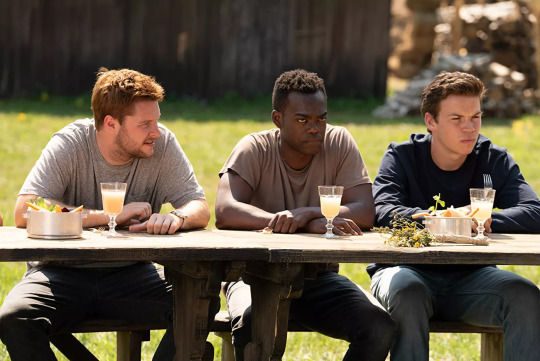
Midsommar’s first act may have unfortunately contained a lot of my favourite moments. It introduced the main characters and worked to convey the relationships between Dani and Christian, as well as with Christian and his friends and how they all felt about Dani. I appreciated the time put into the dynamic between Christian and his friends and how they viewed Dani, although this was sort of thrown away once they got to Sweden; I never saw any sort of resentment from them towards Dani after that. Pelle obviously felt a lot differently about Dani, going as far as to kiss her during the latter stages of the movie. I’m not sure why it was necessary to have Pelle feel this way and I don’t understand what it added to the story besides forcing some conflict into Dani’s relationship with Christian, which was being achieved on his end regardless. Along with this, we are also shown the unfortunate and upsetting demise of Dani’s family which acts as a plot point in helping Dani to decide upon accompanying Christian and his friends to Europe. Seeing what happens to Dani’s family may have been the most affecting part of the movie for me. To top it off, her reaction was absolutely chilling; I love how Aster gets such raw and believable performances in his films. Dani’s loud, pained cries made me feel for her so much and forced a deep discomfort into me that carried through as the credits and title came on screen. Something that intrigued me quite a bit during this first act is how conversations were filmed through mirrors. We would see a couple of instances of characters talking to other characters that were reflected in a mirror. These static shots that carried on for a short while added to the tense atmosphere and the conversations or arguments that were taking place, imposing a kind of separation between those we could see outside the mirror and those we see inside the mirror. The main cast we’re introduced to in America are all good and give believable and compelling performances. Florence Pugh was fantastic as Dani; William Jackson Harper was decent; Will Poulter was great and one of the stand-outs from my experience. Vilhelm Blomgren portrayed quite an interesting character in Pelle. Christian seemed to be the only one that rubbed me the wrong way because he was such a massive dick the entire time and he was never redeemed. Not to say Jack Reynor’s acting was bad (quite the opposite in fact), I just didn’t sympathise with the character. There are aspects to the characters and the decisions they make that wound me up a bit but in terms of the acting, they were more or less solid.
The secondary characters, or mainly the Swedish locals didn’t stand out as individuals to me, possibly because they were portrayed more as a collective, which is fine but I would’ve liked to have seen some character development from at least a couple of them. Now, I say it’s unfortunate that I derived the most entertainment out of this first act because after that, Midsommar suffers quite a bit from some pacing issues. This movie is almost two and a half hours long and it didn’t feel like it needed to be, especially with a plot that only allows for so much exploration. The plot itself is quite basic, but it is displayed as something so grandiose in scope that it comes across as being eminently pretentious. Could it be the insanely short production time that went into making Midsommar that makes it feel fairly lacking in a few areas? Or is this genuinely the cut that Aster wanted? Results from a quick search of the movie told me that around half an hour of its running time was cut due to the content it presented. Consequently, this will make the home video release different to some degree than the cinema release as it may come to our TV screens as a director’s cut. If this is in fact the case (and I do intend to buy the blu-ray upon its release) then could it be that we’ve not even seen the movie that Ari Aster wanted us to see? Will a director’s cut make it better, worse, or simply just longer? I for one am assuredly excited to see what the end result is.
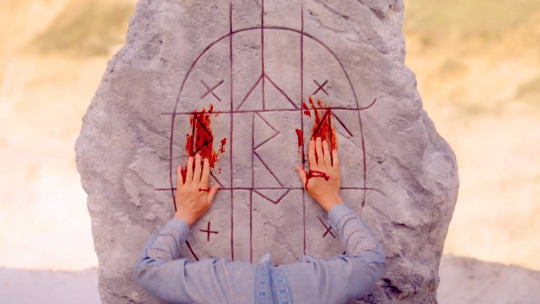
A big problem I had with Midsommar is how early it peaked in regards to the horror. One of the first things the main characters are presented with upon arriving at this rural community is the idea of people being separated into groups depending on their age: the concept that they didn’t consider themselves adults until a certain age; that they didn’t work until they were old enough to; that they died when they reached a specific year of their life. They’re then told that a ceremony will be held the next day and while our main characters ask what it is, we see William Jackson Harper’s character, Josh smiling in a sly “I know what it is” kind of way. His friends try to ask what he knows, to which he does not divulge anything. What follows this is a scene wherein two elderly people sacrifice themselves by falling off of a cliff in front of the other members of the community. To me, this scene was beautifully unsettling for a number of reasons. Despite expecting them to jump initially, I was still shocked at how well it was executed both in relation to the story and in a technical sense. At first, the woman jumps off of the cliff, dying instantly with a bloodcurdling crunch. Of course the characters from America and the characters we are introduced to earlier from England are understandably shocked. Even Josh reels back in surprise which I found to be a little strange considering how he acted as though he knew what was going on beforehand. What did he think was going to happen if not that? We’re never told. As the old man approaches the edge of the cliff and the English and Americans clue in to what is happening, they react as I’m sure we all would to what happens as he prepares to jump. He lands in a much more awkward fashion with a smaller sound that is no less distressing. Only this time, he doesn’t die... The scene is then racked up a notch as he screams out in pain at having his leg torn off and his body broken on impact. The rest of the Swedish onlookers scream in pain with him and it is terrifying to hear. I imagine this painted a picture to most viewers that the locals we are presented with in this rural Swedish village are all somewhat spiritually connected; are able to empathise with one another's emotions in a way that makes them able to feel the sensations of those they’re close to. Undoubtedly the torment doesn’t stop there and Aster has to quite literally hammer home what this ceremony is all about. In order to put the old man out of his misery, a group of people take it in turns to smash his head in with a large mallet, causing further stress to the main characters, but stopping all of the Swedish inhabitants from screaming in agony. That whole scene… was awesome! I loved it and it stands to be maybe my favourite sequence from the movie. The unfortunate part is that after this happens, I expected everything to amp up a bit and start showing me more uncomfortable and fucked up things but sadly this wasn’t the case. In a sense, it was as if the movie blew its load on this earlier scene and didn’t focus on too many other stand-out plot beats which was pretty disappointing. For some reason, Will Poulter’s character ‘Mark’ had slept through this ceremony and as a result, hadn’t experienced what his friends had. Whether this was done for a specific reason I’m not picking up on or simply so that he could continue to crack jokes is beyond me. I will give credit where credit is due: this movie made me laugh when it wanted me to. The inclusion of comedy in Midsommar was expertly handled and never made it come across as a lame horror-comedy.

Prior to this and upon arriving in the green fields of rural Sweden, the protagonists all get high and lie around in the grass. While the comedy kicks in here, it is also notable for the reaction of Dani as she starts to feel the grief of losing her family once more and urgently tries to get rid of it. I liked this scene and how it played slightly with the visuals which foreshadowed the inclusion of drugs and their effects later on in the movie. Sadly with what happens to Dani’s family in the first act, I’m not sure it was that purposeful overall, despite liking how it was depicted. Yes, this event does explain how Dani acts for sections of the film and yes I did like seeing it act as a catalyst for why she goes to Sweden in the first place, but I’m not sure it was hugely purposeful when referring to the movie as a whole. It never came back in a way that affected the narrative or the story that was being told. It was just something that happened to the protagonist that caused her a great deal of upset. Almost as if they could have died in any number of terrible circumstances and it wouldn’t have made a difference. While I really liked the characters’ first drug trip sequence, I got worried early on that Midsommar was going to take an approach that put the trips and the drugs at the forefront of the movie, akin to something like Shrooms (which was just awful) and sure, they played a big part but it did more to enhance what was actually happening rather than fabricate a story that didn’t really take place, just to have them wake up in a field exclaiming how crazy their collective trip was.
As the characters start to become more and more under the influence through the drugs that they’re given, we see the world warp around them. Trees ripple and form faces; the food would shift; flowers would pulse in accordance to Dani’s breathing; characters’ facial features would distort. Dani starts seeing grass sprouting from her hands and feet, or vines mimicking her movements to show how she’s progressively becoming part of this society. Characters like Christian however start experiencing the drugs in a negative and more aggressive way, as if they’re being attacked by senses! There is unease and terror in how Christian experiences the festival, whereas Dani’s experience is comparatively happier. The contrast of how Dani was being accepted and Christian was being rejected was thrilling to see, markedly in how Dani’s demeanour changed as she found herself integrating with everyone else. Although I must say I’m not sure why they kept drinking that drugged water that looked like muddy urine. Christian almost refuses to drink it until he’s told “it’s spring water with special properties” which was all the information he needed apparently! What properties were they? Doesn’t matter; he drank it anyway. The moronic decisions manage to manifest more throughout the movie, however. Regrettably we don’t get to see much of Mark and Josh’s experience with the hallucinogens or even much of the festival because their time is cut short in a manner I didn’t find all too entertaining. Mark is the first to go from the original team. Due to urinating on a sacred tree, he is murdered off-screen and has his face cut off. This could’ve made for a superb scene if it were done right but the way it was handled came across as hollow. Elements akin to this could have worked to convey unease and terror, but they are implied rather than shown which can work in some circumstances but I would’ve liked to have seen something more memorable and haunting instead of seeing an after-product and thinking “okay well I guess that happened”. Show him being mutilated, you cowards! You don’t even have to show it; just possibly what happens in the lead up! It would’ve made for a far more compelling story beat! All that happens is a girl comes up to him as he’s eating with everyone and asks to show him something. His response is just “she’s gonna show me” and leaves. He doesn’t question what he’s about to be shown; he just gets up and wanders off with a girl he doesn’t know in a foreign country, going purely off of Pelle’s word that everyone there is great! What a way to force that in! Josh is next on the kill list because he took some pictures of a sacred book when he knew he wasn’t supposed to because either he’s just insensitive to other peoples’ cultures, or he thinks it’s okay as long as it’s for his thesis. After this happened I kind of dropped off. With most of my favourite characters gone and the remaining characters questioning everything less and less, not only was there not much left to ground the film in a world that would consider the things that were happening to be deeply disturbing, but also from the protagonists’ perspectives as well.
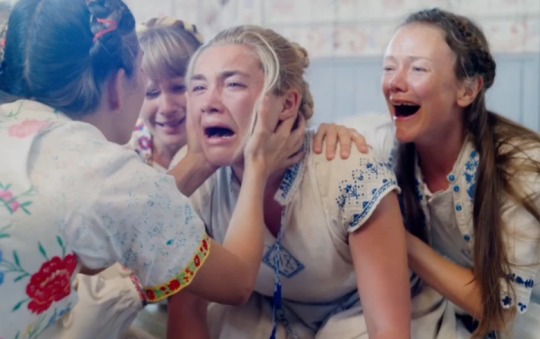
I’ll acknowledge I’ve been railing on this film a considerable amount... with good reason. But despite being heavy on the criticisms, I still consider Midsommar to be a good, even great movie! I adore films that beg me to revisit them and learn more about them with each watch. Sprinkled throughout Midsommar are a tonne of small details and I’m sure I didn’t pick up on everything; in fact I hope I didn’t. Along with strange “what the hell?” moments like putting scissors under the baby’s pillow (I think that’s what it was anyway) that I still don’t understand, there also exists things that maybe don’t need to be thought about but are still nice to see included, such as goats and cows that took the immersion into this countryside village a notch higher. Or to draw from more obvious details that add depth to the people: going back to how they would all scream in unison, for instance to empathise with another’s emotions; when Dani sees Christian cheating on her, all the girls she is with cry and scream with her, possibly to experience what she’s feeling and/or to show her that they consider her to be part of their people, which also manages to contrast with earlier in the movie wherein she’s with Christian in her apartment but she’s the only one experiencing the intense pain as Christian tries to comfort her.

Upon entering the third act I started to wonder what the actual point in Midsommar was. Could it possibly be one big metaphor for grief and how we can choose to deal with it? There didn’t seem to be that grand of a point being made, either in the relationship between Dani and Christian, the relationship between America and Europe, or just the presence or influence of cults and religion in different parts of the world; those ideas seemed somewhat surface level. So I can’t help but think it was trying to convey a more metaphorical meaning. Either that or its meaning was just “Europe’s weird, man”. In this way, the finale didn’t leave much of an impact besides leaving me feeling quite hollow and disappointed, wondering what all that had been in service to. I can’t say Midsommar blew me away with much of what it showed me. There were a few decisions made which weren’t all that original in how they were executed and there were some dumb moments that had me questioning why they were included at all. Yet I would never say it isn’t unique in what it achieves; I can’t disregard all of the jaw-dropping technical showmanship and the interesting, creepy ideas that managed to meld horror and suspense and mystery and comedy into something I simply don’t know how to categorise. I could talk for ages about this film and still not touch on absolutely everything about it. Ari Aster is clearly a talented guy and I can’t wait to pick up the blu-ray and watch it a million more times. Along with that, I am for sure going to see whatever he puts out next. These are the kind of movies I love seeing and supporting and I honestly can’t recommend Midsommar enough because it’s something I feel will resonate with different people in different ways, evoking more than a few interpretations of it. It is so worth the watch.
★★★½
24 notes
·
View notes
Text
Exodus Lore: the Legendary Warriors, Holy Angels, and Great Demon Lords
So, since this will be relevant to any Warrior, Holy Angel, or Demon Lord muses who chose to interact with either of my Exodus (blog main) verses, I wanted to put this out there and clear up the exact history of these important figures in the history of Exodus, and Lucemon’s relationships to all of them. I will touch briefly on the Knights, as well. But as we have less set in stone for them, their lore is much looser and more open.

As in Frontier, Lucemon existed long before the Warriors did. They were one of the first beings to come into existence aside from the those who existed in the primordial soup of the Digital World (while this does include the data that makes up the Warriors, they did not exist in their individual forms as we know them, so Lucemon as an individual entity is older).
Lucemon is the youngest in an original Pantheon of angels which included such beings as the Holy Trinity, along with some less historically preserved characters such as Bagramon.

(x)
The full list of angels in the original Pantheon (as of right now; more may be added later), is as follows:
Lucemon - Lucemon FM
Seraphimon - Seraphimon Fallen - Daemon
Ophanimon - Ophanimon Fallen - Lilithmon
Cherubimon - Cherubimon Vice - Belphamon
Holydramon - Barbamon
Marinangemon - Leviamon
Valkyrimon - Beelzemon
Bagramon - Bagramon Fallen
Hartmon - Morrigumon
Rasielmon - Grandracmon
Dominimon - Gulfmon
Guardiangemon - unfallen
Clavisangemon - unfallen
Darcmon - unfallen
Mastemon - status unknown
These angels were a product of Drasil wanting a justice system for the Digital World. This is the group who was charged with ending the Human-Beast War, the resolution of which was most heavily credited to Lucemon. But due to several defecting in various ways over several centuries, the majority of the original Pantheon was culled, the strongest seven being branded with the Seals of Sin. These are the mons who would go down in history as the Seven Great Demon Lords.
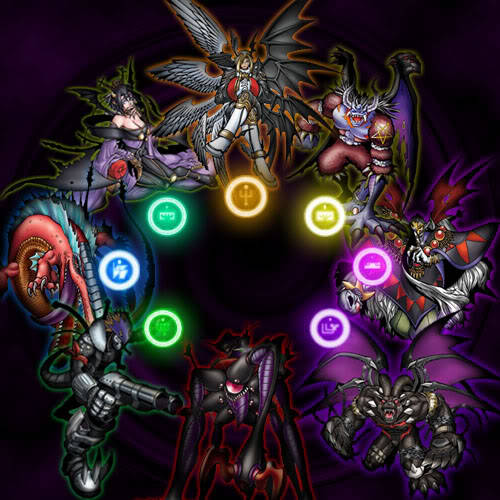
(x)
The two exceptions to those strongest mons who were branded were Bagramon, and Rasielmon, as they were the first to be cast out for distributing the X-Antibody throughout the Digital World during the X-Death era, and were not among those who took part in the first Great War of Heaven.
The Royal Knights were made to compensate for this massive loss in security programming, with far less free will than the Angels ever had, to avoid another mass rebellion. The Holy Trinity (second generation) of angels was re-created, as well. Though they served more as a symbol of the Light in the Digital World and figureheads of peace, and had little actual duty to the Digital World as a whole aside from their appointed role as “peace keepers.” All of these new mons were individually less powerful than the original Pantheon, as well, to avoid any one of them growing too strong. However, this does make any one-to-one fight against one of the Fallen entirely skewed in the Fallen’s favor. This is why the Knights were created to function as a unit.
The Warrior Ten did not come into existence until well into the Demon Lords’ campaign against Drasil, at which point they were not called the Warriors. They were initially theorized by some to be a product of the Sovereigns, but while they both seemed to emerge from the same raw data of the world, the Warriors showed no servitude toward them as the Devas did. So common Digimon as well as the Demon Lords and related mons were left without a proper explanation for these unique and quite powerful new Digimon.

(x)
Perhaps surprisingly, at first the Demon Lords and the Warriors did not have qualms with each other. The Warriors saw themselves as protectors of the natural world, and the Demon Lords saw themselves as protectors of the spiritual world. And unlike the Royal Knights, the Warriors had no obligation to Drasil, and hardly interacted with it at all. As long as their World was not threatened, the Warriors had no reason to fight with the Demon Lords or anyone else.
The conflict arose after Bagramon’s disappearance from the Dark Area at the hands of the Royal Knights. Lucemon, the youngest but most ambitious member of the original Pantheon, was crowned King of the Dark Area, and given the role of ruler in Bagramon’s absence. With their progenitor, a mon they considered the champion of those cast away by the world at large, missing at the hand of Drasil’s underlings, Lucemon was beyond enraged. They vowed to take down Drasil by any means necessary, even if that meant becoming a god themselves.

Lucemon set on a mission to become the strongest and wisest Digimon in existence. This started with a war to conquer the entirety of the world itself, which progressed with terrifying success on the part of the Demon Lords. This is when the initial concern began among the Warriors. However, they did not escalate into full-out warfare until Lucemon began to devour parts of the world to feed their power-- threatening not only what they protected, but their very existence.
They fought long and hard against Lucemon, and were the first enemy to truly slow their progress. With Lucemon’s immense following and ever-rising power, the Knights were no longer any match. They had long achieved the title of strongest individual Digimon in the Digital World, and were slowly attempting to rise above their god status to take on the Core Kernel. And along with this overflow of power, Lucemon’s sanity began to wane as they took greater and greater risks. The Warriors knew not of the finer workings of Heaven, and only that their home was being destroyed, and the curator of all this destruction needed to be stopped.
But then, they hit a plateau. They were able to stop Lucemon from devouring what was left of the world, but Lucemon had far surpassed their power and was getting closer and closer to attacking the code of the universe directly. With no other options, they reached out to legends of old. it had been told that the Sovereigns had become gods through the partnership of humans-- beings from an entirely different world. And with the entire world on the line, the Warriors sent out a desperate plea for help. A group of children answered the call, coming to the Warriors’ sides in battle, and aiding them in achieving their utmost power.
It all came to a head when the Warriors confronted Lucemon as one unit. Lucemon had been planning their final attack on Drasil, despite several of the Demon Lords defecting from the cause due to Lucemon’s growing insanity. And when the Warriors confronted them, they were caught completely off-guard. How this was achieved has been lost to history. But the fight went down with the Warriors having the advantage of preparation. To give them even more of a leg-up in the battle, Lucemon had long been neglecting their physical and physiological needs for favor of absorbing raw data, and they had grown unsteady. However, this did not take away from their godly power, the affects of which would leave the Warriors severely damaged, some being mortally injured in the battle. Lucemon was only brought down when the children merged the Warriors’ spirits into Susanoomon, who was finally able to defeat Lucemon and lock their data away in the Core of the Dark Area - the condensed heart of the Digital World from which Yggdrasil's roots grew. Lucemon was damaged so severely in the battle, that the data they had stolen from the world left their form, and returned to the Digital World, making it whole once again.
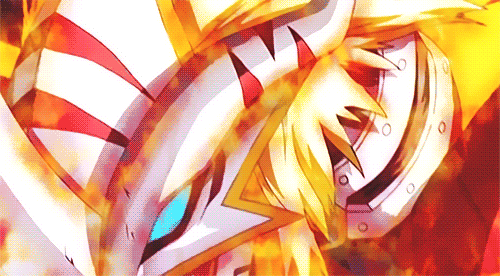
However, many of the Warriors did not survive the battle. All except AncientGreymon and AncientGarurumon perished in the hours after the battle ended, and their spirits reverted into totems which the two remaining Warriors kept very close to them. These two would be the ones to send the children back to the Human World. They would remain for several more decades, acting as the world’s Last Guardians and bringing down a few other major threats who arose in Lucemon’s wake while the world rebuilt itself. Then, once their lives were also spent, their spirits reverted into totems, as did the others. These totems were later sought out and gathered by the Royal Knights, and ordered under lock and key by Drasil to prevent anyone form gaining access to them.
As for the other Demon Lords, the ones who remained to fight were scattered about. Belphamon was knocked down to one of his lower forms, and disappeared some time after the battle was over. Lilithmon vanished before the battle started-- an occurrence Lucemon blamed on the Warriors. Leviamon was sealed in a cavern in the deepest ocean by AncientMermaimon, left in eternal darkness. Daemon abandoned the fight mid-battle, seeing that Lucemon would lose; he has planned to absorb Lucemon’s data, but was prevented from doing so when the Warriors sealed them away. Barbamon was defeated and slunk off to a cave in a mountain in the far reaches of the Digital World, where he grew his hoard and avoided the average populous. Beelzemon had left long before the battle started, wanting to part in Lucemon’s tyrannical conquest. Many of them remained trapped for eons before eventually being released by one method or another. The rest simply remained in the shadows, the fallout from the lost battle so great that they knew the world would never accept them.
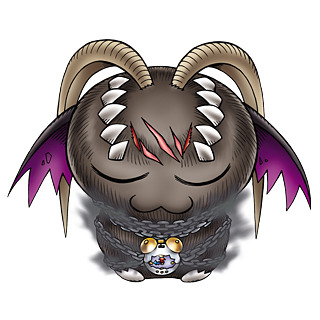
Lucemon remained in the Dark Area for four thousand years, and was presumed dead by most of the world. Drasil would rewrite and retell history several times over the course of the years, going as far as to hard reset the world and erase the memory of everyone on the mortal and sometimes celestial levels, as humans continued to find their way into the Digital World despite its best efforts. The Dark Area and the Core within, however, were immune to these resets, and the denizens therein would remember everything. There are very few Digimon who can recount the history of the Digital World as it really happened, and even fewer who are willing to talk about it. This has left most of the world without a proper history of the Digital World. A Monoshiri book dictating events prior to the culling of the Pantheon does exist under Belphamon’s possession, but was left in Old Heaven and was only recovered when Lucemon took back that location during the war. Belphamon used this time to add events he had been recording from the past several eras to the book, before it was once again wrenched from his hands. The book has been lost ever since, likely hidden away somewhere in the ruins of Old Heaven-- a location not considered to exist at all by the Digital World at Large. A copy of this book does exist in the hands of modern High Scribes (such as Bokomon), but this is not the original book. If you ask and of the original Pantheon, you will get accounts from varying viewpoints which vary wildly from what commonly circulated history books say.
The shifting of power and intrusion of humans continues to this day in the Digital World, the latest being the rise of eaters in the Digital World. Drasil has blamed this on human involvement, and remains adamant that humans do not belong in the Digital World.
Full List of Powerful Digimon in Exodus (Will be added to as time goes by.)
#☉ Exodus Lore#☉ Stop Looking Up for Heaven (Exodus Mainverse)#☉ How Bright I Used to Shine (Classic Mainverse)#☉ Records (headcanons)#☉ Brothers in Arms (Demon Lords)#history#information#☉ Saviors of History (Chosen Children)#☉ Children of the Author (my OCs)
8 notes
·
View notes
Photo
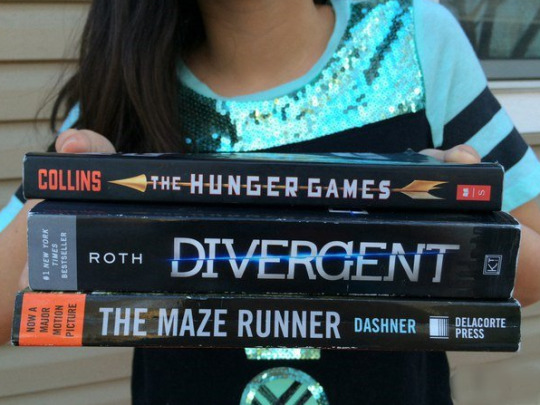
Dystopian fictions depict a negative view of "the way the world is supposedly going in order to provide urgent propaganda for a change in direction”. Susan Collin's Hunger Games, Veronica Roth's Divergent series and James Dashner's Maze Runner series are popular dystopian science-fictions which consist of a few similar concepts and they really are amazing novels to dig into. I much prefer to read books before watching the film adaptation so that I can imagine and creatively picture the characters and events. Dystopian worlds have existed in all sorts of forms - whether we look at Narnia under the White Witch or George Orwell's Animal Farm or Frank Herbert's Dune - but these science fiction dystopians are a new twist on the genre. A few glaring similarities between HG & Divergent: One guy character who is so incredibly perfect you wonder where they make these men. (Peeta, Four) Check. One main female character who emerges as a leader and grieves for the losses she has suffered as a result of War. (Katniss, Tris) Check. The main guy is subjected to some treatment which makes him think that his female love interest is his enemy. (Peeta is implanted with fake memories, Four is injected with simulation serum) Check. The people are divided into different sections and each section's population acts in a particular way or engages in a specific profession. (Districts, Factions) Check. We can find young protagonists who are pitted against each other in winner-take-all battles to the death which reflect to what adolescence have turned into. If you spend your early teens being told that your future depends on how well you do on your exams and on effectively simulating the appearance of a socially, politically, and artistically engaged super-being.... well, you have no problem identifying with youngish heroes who must emit a constant stream of miraculous exploits or be crushed. HUNGER GAMES The Capitol is the cruel Government of the twelve districts of Panem which holds a tournament every year called the Hunger Games. Each of the country's 12 districts must offer one girl and one boy between the ages of 12 and 18 to fight to the death on live TV. Katniss Everdeen, a 16-year-old girl from District 12, volunteers to take her younger sister Primrose's spot in the tournament. From her district, she's joined by Peeta Mellark. In the second book, Catching Fire, the Capitol are furious at Katniss for starting a second rebellion, so they create a special version of the Hunger Games for all the previous victors, which means that she and Peeta must return. During these games, they create a team of victors, who manage to destroy the arena and escape to District Thirteen, which most people thought did not exist. However, the Capitol capture Peeta, and they destroy District Twelve. The last book, Mockingjay tells the story of Katniss leading the revolution. They rescue Peeta, but he has been tortured and now he hates and fears Katniss. A team of rebels including Peeta and Katniss then go on a mission to assassinate President Snow in the Capitol, but Katniss' sister Primrose is killed by a bomb. Katniss later discovers that the president of the rebels made this bomb, so she kills her own president in place of Snow. She then returns to her home, District Twelve, to try to recover with Peeta. At the end of the book we see them married with two children. DIVERGENT When I first read Divergent, I was so awed that it got me hooked straightaway and I finished it in less than 24 hours. The story revolves around a young girl name Beatrice, aged sixteen, who lives in a divided society where people are split into five factions according to their personal qualities. The factions are Dauntless (the brave), Candor (the honest), Abnegation (the selfless), Amity (the peaceful) and Erudite (the intelligent), and each individual must choose a faction at the age of 16. 'Abnegation fulfills the need for selfless leaders in government; Candor provides trustworthy and sound leaders in law; Erudite supplies intelligent teachers and researchers; Amity gives understanding counselors and caretakers; and Dauntless provides protection from threats both within and without.' Her aptitude test result is Divergent which apparently means that she possess multiple personality traits. She eventually choose Dauntless during the Choosing Ceremony and strive to be a member of that faction, otherwise she'll turn out to be a factionless, in complete isolation and in abject poverty which sounds like a fate worse than death. Once, she entered into the Dauntless faction, she changed her name to Tris. Divergent reflects the contemporary division of our society and also all those who find it difficult to fit in, can also relate. I wonder what would have been my aptitude test and which faction I would ultimately choose and came to the conclusion that Candor and Amity suit me best. 'We Will Rock You' style: Clap, clap, stomp. Clap, clap, stomp. Clap, clap, stomp. Clap, clap, stomp. We are, we are DAUNTLESS We are, we are DAUNTLESS Beatrice, Now called Tris, Made a big change Playing on the trains, She became a Dauntless one day She's got mud on her face A parental disgrace Now she'll be kickin your ass all over the place Singin' We are, we are DIVERGENT We are, we are DIVERGENT Tobias is a Dauntless, Divergent Shoutin' to them all, We can take on the world today Erudite got blood on their face We'll put them in their place Into the past, out of our Fear Landscapes Singin' We are, we are INSURGENT We are, we are INSURGENT The simulation training is really fascinating. 'The simulation stimulate the amygdale which is responsible for processing fear, induce a hallucination based on fear, and then transmit the data to a computer to be processed and observed.' 'Learning how to think in the midst of fear is a lesson that everyone needs to learn.' 'It's basically a struggle between your thalamus, which is producing fear, and your frontal lobe, which makes decisions. But the simulation is all in your head, so even though you feel like someone is doing it to you, it's just you, doing it to yourself.' The less number of fears you've got and the less time you take to confront your fear, the most successful you are. This also left me wondering about the numerous fears I'll face if ever I'd taken part in such simulation. The last book, Allegiant, revealed blatant truths about the world Tris was living in which boost up my excitement but that did not last longer. The fun and laughter is over. I remember finding myself staring blankly in disbelief as it was an ending I absolutely didn't see coming and to be honest, I find the main character's sacrifice comes off as utterly meaningless. As it turns out, the world has apparently been so full of assholes that the government decided to eliminate the genes in citizens that caused dishonestly, selfishness, cowardice, stupidity, and aggression. Unfortunately, this backfired and just created more assholes that were more asshole-y than before, that is genetic damaged people. Hence, the government constructs gigantic city-sized behavioural experiments all across the country and get volunteers who had their genes screwed with to have their memories wiped and stick them into a city and force them to choose a faction. Eventually these people will reproduce enough times until they finally manage to have "genetically pure" (a.k.a. Divergent) babies that are free from messed up genes. The story shifted from the old unresolved conflict between the factionless and the factions to a whole new conflict between the genetically pure and the genetically damaged people. Much time and energy are spent fighting for something that isn't really a problem for the most probable reason: they have been taught that it is a problem. MAZE RUNNER The story starts off with a boy named Thomas who find himself in a strange place called the Glade where there are other guys known as Gladers. Outside the glade is a maze which has to be solved for the Gladers to be out. There is one threat stopping them from figuring out the maze, one threat stopping them from going out at night and from going too far into the maze, horrific animals that go by the names of grievers which are giant bug-like creatures. Many of them lost their lives fighting grievers and finding their way back, but eventually the rest of them made it till the end only to discover that they are all suffering from the most horrible disease known to mankind called The Flare. In the second book, The Scorch Trials, some of the boys discover another group of girls who also underwent the same experiment. Solving the maze was supposed to be the end but instead of freedom the Gladers find themselves faced with another trial. Burned by sun flares and baked by a new, brutal climate, much of the earth is a wasteland. They met Cranks who are people covered in festering wounds and driven to murderous insanity by the Flare, roam the crumbling cities hunting for their next victim... and meal. They must cross the Scorch, the most burned-out section of the world, and arrive at a safe haven in two weeks. In the last book, The Death Cure, we learn more about the Flare. The Flare virus was engineered by the founder of World In Catastrophe Kill-zone Experiment Department (WICKED) in an attempt to control the human population because there was so many people dying, the founder says that the virus was supposed to wear off after a while but the virus got out of control and now only the immunes can stop it before the virus kills all of the human species. Nothing mentions on how the immunes were suddenly 'immune' to the virus, and the number of them is massive, it is like as if it is an experiment to see who is strong enough to withstand the heat, this basically indicates that if they can survive the Flare virus, they can survive the heat, but that got out of control so they are now killing and experimenting on the immunes. In the end, everyone goes through the Flat Trans, and on the other side is a paradise. Like a legit paradise with green everywhere and an ocean and everything. So, eventually the Gladers really made it and are free. But that's not really the end. We get another epilogue with a memorandum from Chancellor Paige. In her memorandum, she says that the paradise for Thomas and the 200 or so Immunes was WICKED's Plan B. Once their Plan A had been ruined, they decided the only way to save the human race was to get a bunch of immune people to start civilization all over again; to do this, she made Brenda and Jorge help Thomas make it to paradise. In the end, WICKED does end up saving the human race, despite the awful crimes they've committed against humanity.
4 notes
·
View notes
Text
I am back, well for the most part. This process being contingent upon my time management and allotment of same. Believe me it is not from lack of desire, rather it is dealing with the typical Luciferian practice of distraction and delay; added to that is their ubiquitous practice of poisoning those they target, along with the microwave and other energy / frequency weapons used on targeted individuals. An if ever there was a target on their BINGO List I am in the top three. I live only by the grace of God. Presently it appears individuals are putting some petroleum based distillate into my drinks and food. I suspect that there are several other types of unhealthy food additives being put into that which I consume. The other items I suspect are some sort of heavy metal salts like Thallium, Arsenic, or similar. The only good thing that can be said about what is presently occurring is that thus far they have not resorted to using metal salts which have been irradiated, like they did when I was being Fox-ed in Southern California around the Long Beach and Wilmington areas primarily. Even so the amounts have been sufficient that if I was anybody else, I would be very concerned and more than highly upset at several persons around me, all the more so given the great lengths they go in saying we are fast friends, family even. An although I know I will survive I am needless to say highly upset. Yet my circumstance is not such that I can easily or directly deal with the matter. Instead as it is part of the larger issues I have dealt with all my Life I prefer to just add it to an ongoing tab. Soon enough the paradigms and social conventions we Live by shall come undone, and my hands will be free. When the Kid gloves come off, and I am given leave from my G-d I will commence to balancing the scales. Until then I must suffer the indignation and deprivations to my soul. This exposition project will continue as time and situation permits.
Thus in consideration to this process I have undertaken it is abundantly clear that I should present myself and a general perspective of the terms I have strove to have all my Life. All the more so since in pursuit of the purpose of this blog and my venturing out into the media of sorts will invariably bring the entirety of my life under the scrutiny of those that will for one reason or another seek to discredit what I intend to present. An I being the disreputable soul that I am will be an easy target. Wherefore it is incumbent upon me to get out ahead of the ball on this, so to speak. I know that no matter how I attempt to be forthcoming on matters of my personal life and the manner in which I have Lived. I will invariably miss many details that in due course will bite me in the arse. I am fond of reminding persons that Life is in the Living; and that last I checked Living was and is a very messy process. Or, rather it can be. An all things considered I have done a bang up job of leaving a mound of detritus in my wake. A side effect that has only increased as of late, albeit with a helping hand from those that would rule over the world. At the time of my composing this my Life has become defined as a series of ongoing train-wrecks. What chance I had to have any kind of Life resembling normality is no longer serviced by the train station. Regrettable as it may be I am at least comfortable with that reality. Wherefore how best to succinctly present a proper representation of the Life I have lead which represents a degree of my thought processes and a degree of my character and nature. A usually straight forward idea, yet for myself I find it immensely difficult. Yes I am a son of Light, I have always professed the Truth. Nonetheless I was raised to be a Man, a hard Man of character meant for vastly more difficult and dynamic social and cultural circumstances than has thus far been required of me or us in general as the human race. Yes we have Lived through challenging times even survived an insane period of global ego paranoia we commonly referred to as MAD. The legacy of which will yet play out in the not too distant future. What we as in the entire World must struggle and fight Our way through beginning shortly within the coming months, to frame it in proper temporal perspective. These events will exceed all that has happened in the past. The Seers of Old were shown many of these things, they however lacked the conceptual context or even words whereby to begin to explain what had been revealed to them. My mother worked hard to raise four Men, as she understood that to mean. We all were each individual anachronisms for the present. We belong to times five hundred to five thousand years ago. Understanding this, perhaps the rest will find context and help those that wish to maintain perspective. Elsewise my existence and life’s work will seem almost contradictory to my stated purpose and desires. Hell I will be the first to admit I am a living ball of contradictions; nonetheless I have maintained a course that has been exemplified as of late. A portion of the story we shall attend to a bit later; sooner than it would in chronological order.
Thus Be it Known I was born August 31, 1960, in the year of Our Lord. In the humble back water town of Socorro, New Mexico. And yes, New Mexico is a State in the Union of the United States of America. My Christian given name is as my fathers, thus making me a junior. My father is your typical WASP American. Gifted with a Highly keen intellect and analytical mind. My Mother’s people are a unique blend of Native American and Spanish. Our Spanish roots go back five hundred years. Two brothers were shipped to further point in the Spanish Empire to protect their bloodline till the end of time. They came in chains as Crypto Jews fleeing the Spanish Inquisition. My father later was one of the engineers working on the Mercury and Saturn / Apollo Rockets which eventually landed men on the moon. My parents being the strongwilled dynamic individuals that they were eventually divorced, with my Mother taking us from California back to New Mexico. I was blessed to have lived in New Mexico when it was an open confluence of differing forces and ideologies. It is sadly no longer such a place. I grew up in the company of different beliefs and fellow students who came from backgrounds that valued intelligence and knowledge. At the same time others taught me that a person needed to see beyond the bonds of knowledge and see the foundations of the world and universe as they were originally cast that being spiritual and some would say ethereal. Thus to me understanding Our World from more than one perspective or level of sight is normal. As a matter of fact this perception of reality goes all the way back to my earliest memories back to being in my crib. An when it comes to sighted, I in previous conversations with others have described how my vision worked when I was younger. As many of us may recall from our halcion days of being in elementary school. There were those overhead projectors which our teachers would then apply various overlays. Well that is a very good analogy of how I actually would see my world. There was/ is the reality that everyone sees, then there were generally two additional overlays, usually one in front of and one behind the norm. But this could also be two behind or two in front of the norm. On rare occasions there would be more than two in a variety of configurations. At times the overlays would have no obvious association to the normal view. Matter of fact I have had here recently cause to remember images I saw almost fifty years ago. Some things that go back to before I was two. Now I have always thought I was a bit different, and naively I to this day can’t fathom that everyone doesn’t in some way or another see the world similar to how I have. Being a precocious young man to say the least, I do recall the statement that if you would be great that you should select a great adversary. An as Lucifer is Humanities great adversary it was natural that I would select him. Now it was also an extension of my visions from when I was nine. So as I listened to the conflicts of the day, did I become aware that there among the idyllic images of society that I heard Lucifer’s voice spreading his lies and vile beliefs. Since no one else was pointing a finger or raising an alarm in that sector I figured I might as well go poking around. That when I was approximately sixteen, needless to say it has been one hell of ride. Now, bit by bit I have slipped into the abyss which is present in all part of our society and culture. Because, well that is where I was needed the most. However it takes a toll and like some foul ichor adheres to those who travel extensively in it, such that for fear it may infect anyone not disposed to it I avoid deceit folk. I have made my way doing business and working often in the byways of this abyss. As a female friend of mine once cried to me that I couldn’t let myself be killed because in all the world I was the only person who did what I did. That I would actually willingly go into to the places that these Luciferians inhabit to take the women and child out. Others might help, but none of them would go into the place alone and face them down. To this I must admit is the Truth. An for anyone else to do it would be a fool errand. Because as they stare at me with fake smiles wanting only to kill me; I would stare back and challenge them to bring it. They wouldn’t because what they see when they look at me is a blackness darker than any they have seen before. Now along the way I have become a felon more than on one occasion. My record shows several convictions, some I am not guilty of what I am convicted of having done. As is often the case the Truth is the first victim of a good fight. And believe me I have been fighting the good fight for a long time, up until recently I have generally gotten a big return on my investment. Recently I have been handed my ass to me in spades, with nothing to thus far show for what it has cost. Believe me it has come at an immense cost, with no end in sight. Yet it is the ticket I bought on my way to Creation; so Hell be Damned if I am going to start whining now. I do at time bitch a little, but I am only human after all. Hahahaha……..
So, having accepted responsibility for having lived the woolly life that I have. To say I have a checker board past is to be kind but nonetheless True. Consequently what I share with you is the Truth. I wish I could say it was assembled in a coherent manner so as to be easily understood. Sorry such is not the case. More Over I will no doubt go off into various tangent issues and share what at times is my unique history and understanding of a given issue. Somethings may offend some of the more “sensible” readers. I can accept that. Know that I once thought as almost everyone else in the world. It is only because of my life’s experiences and knowledge acquired by other means that I now believe as I do. What is particularly ironic is that no matter how large my “craziness coefficient” may get; I am withholding the more extreme things I have come to know. Hang on as best you can an hopefully my writings will permit some of you to prepare for that which shall shortly come to pass. Granted my current biggest obstacles are getting past the AI’s that are acting as guardians at the gates. We shall do our best.
1 note
·
View note
Text
Epilogue Thoughts
Well, throughout the clusterfuck of meme reblogs, it’s finally time for me to pull up a velvet cushioned chair and discuss the “tales of dubious authenticity”. As such, there will naturally be spoilers pertaining to both the meat and candy routes, although I’ll focus more on meat, since I actually read a hell of a lot more there than I did with candy. Continue under the cut if you wish.
Since it’s the shortest possible spiel I have to offer, I’ll get the candy route out of the way first. My read-through of the epilogues began with this one, although I only lasted through eight chapters before promptly giving up. The reason for this, is, well... The candy route is just a mess, as it is 100% likely supposed to be. What I had expected from it was what some in the fandom have naturally ascribed to Homestuck’s candy metaphor; Fluff, romance, friendship, happiness, low plot, and so on.
However, it’s clear to me that candy itself extends into something more... sour, if you will, and I suppose it should have been blatant from the get-go, what with trickster mode being apparent in the comic. I only have remnants of memories from those few chapters, as well as commentary from fans which I took into account, and it’s naturally fucking insane. I don’t think I necessarily have to prattle too long on the matter, but, wow. It really does seem like the next edition of trickster mode, and that’s just too far for me, for various reasons. Although I didn’t spend much time preoccupied with the candy route, I’m essentially summarizing it as maximum craziness to a very disturbing degree, and as such, I’m not going to involve myself any further with it. As far as I’m concerned, it never “really” happened from my own point of view, despite it being an option likely disposed to... some potentially canon element to it? I don’t even know anymore. All I can truly attribute to this particular route is a metaphorical, sugarcoated mess on my lawn that I never really wanted in the first place, let alone anticipated.
Moving on to the meat route, there’s naturally a fucking lot that I can talk about here. I suppose you could say... this one will be the real meat of this post. Haha, funny.
Anyway, as you may have guessed, I continued onward with this route a bit after clawing my way through barely eight chapters of the candy route. I did it this way since, if I remember correctly, this particular order was recommended by V, or someone else involved with the production of the epilogues. I think such an order was... an okay choice? I didn’t feel particularly affected by it in hindsight, but I feel as though the upgraded prose and general non-wackiness made me feel somewhat better after the sinister experience of the candy route.
I’ll progress by listing the things that I enjoyed or liked about the meat route first.
1) As I mentioned before, I’m quite sure the prose and convoluted narrative were toned up quite a lot here, along with being linear and not feeling like a mess beyond rectifying. It’s more comprehensible, in spite of about forty six chapters worth of content and so many details to catch on to. There seems to be some sort of purpose within this route, rather than the capricious nature of its complement, which is something I can respect. It still feels sort of unstable, since there’s just so much shit to grasp, but I guess I’ll let that one slide.
2) Just like Homestuck was about honesty when inspecting the struggles, conflicts, and inner workings of teenagers, I feel as though the meat route did nicely in continuing that pattern. The characters clearly still continue having conflict through their adult years, and this is especially shown throughout Terezi and John, as well as the drifting relationship of Rose and Roxy, and the isolated state that Rose and Kanaya were in with each other; Likely being so entangled with their relationship that they distanced from others slowly, yet surely. I have no experience in the range of my early twenties yet, but I have heard other people comment that this captures the particular stage well. I feel like it does, too, since individuals can naturally go through general conflicts such as distance/isolation, mental illnesses, physical or emotional ailments, and so on during any stage of their life, whether it be as a young child, a teenager, or an adult. The depictions of John’s depression felt very, very realistic, and, on a more personable level for me, relatable. The numbing of emotions, the isolation from others, his self loathing, all just... very much captured what depression is really like, in a sense. Not everyone’s experience with depression is the same, but this felt very... close to me. It feels like the first time I’ve ever seen a character depicted with such an authentic struggle with depression, and even a character with such a genuine, visible struggle as a whole. I can’t put into words how reality-based this felt. The sheer fact that even in the epilogues, the honesty that life is difficult and filled with conflict is an amazing expansion to Homestuck’s already in-depth examination of such a thing itself.
3) The relationships are yet another point I’d like to make here, particularly Dave/Karkat and John/Terezi. Dave and Karkat still have this romantic bond, even if they were cagey when admitting it for a bit. They still love each other just as much, joke around with each other, support each other, feel good with each other, understand each other, and are happy with each other. That’s a lot of fucking “each other”s, but I’ll be damned if I can’t get the point across. It’s made very clear cut that they’re still very much in love, even in spite of growing political tensions and other conflicts. As for John and Terezi, it’s shown that they have this very unique bond that no other characters quite have with each other. Sure, they joke around and poke fun at each other, but most of all, they have this deep, innate connection in sort of relating to each other, in a way. They both had experiences with numbness, sadness, depression, and their own forms of trauma, and they were able to discuss some of this with each other on a very vulnerable level during that time. They discussed things that were important to them. Their relationship is also another thing that feels very authentic; Two young adults emotionally supporting each other and just having hope that the other has their back, especially in such trying, traumatic times. This particular bond was so strong that it even went into a romantic area, which also feels realistic, because couples supporting each other, especially under such dismal circumstances, is really fucking important. Although their former forms of communication were essentially two people having fun with each other and just fucking around with each other, this showed us that John and Terezi can reach such a wonderfully vulnerable point, to the area that they just connect so much that they’re in love with each other, whether it be redrom or blackrom.
4) As for the closing positive note on the meat route, I loved alternate Calliope’s role in this. She takes on this role that is to be expected of a fully fledged Muse of Space, what with taking command over the story in lieu of Dirk, at some points. She’s become a true conductor yet again, and she’s putting one of her sole hobbies, storytelling, to work just like before, although in a more expansive way. I think it was quite creative, having her narrate many areas of the story and involving herself in efforts to protect others as much as she could.
And now, I come to the areas in the meat route that I didn’t particularly enjoy or like.
1) For starters, I do really dislike this whole “horny Jade” concept that’s enacted in this route. I realize this is because of her dog hormones, but I find it... very perturbing and disgusting that she’s forcing herself in the midst of Dave and Karkat’s relationship, likely just wanting it to deteriorate so they can provide her with... services, and such. It’s especially horrid when you consider how uncomfortable Dave and Karkat respectively seem to be when she brings such awkward topics up. They stutter, flee, and whatnot, yet she still continues, as if none of it is a blatant warning sign. I don’t really know how hormones or even dog hormones work, but... I’d appreciate a sense of social awareness for her if possible, at least down the road. It feels... off of Jade to be doing such a thing, when, even if not the most selfless of people, she is generally quite courteous and respectful of others and their boundaries. Perhaps the hormones are the cause of her seemingly nonexistent cognizance of their discomfort around her during these times, but it still... unsettles me. I suppose we’ll have to find out later, if they happen to expand upon the topic.
2) Then, there’s my... sort of antithesis to my second positive, if you will. While I did particularly enjoy the realism that this route had to offer, it feels a little too unhappy, dismal, hopeless, what have you with your dejected adjectives and the like. Certainly there are some good things, such as Dave/Karkat and John/Terezi bonds, but I feel as though, at this point, the negative state of the meat route’s narrative outweighs the positives greatly. Jane is likely a new threat to Earth C’s society, seeing as she’s this Condesce-inspired fascist and a xenophobe now in office with likely unwell schemes of her own, John is very likely dead for good and died on a very depressing note due to his mental state, Dirk is in his Ultimate Self mode and seems to have quite the advantage at the moment along with Rose as his hostage, Terezi is still depressed and conflicted, Dave and Karkat wallowed in losing the election by nearly consuming alcohol, but also by going back to their typical shut-in lives, nobody knows about John and never seemed to have supported him, aided him, or cared for him much at all in the beginning and the end, Davepetasprite^2 died, and... overall, everything is looking extremely grim. Not to say that I don’t invite conflicts, challenges, and the like to be apparent in media that I like, but it feels... empty. Hopeless. Like nothing is left, nothing is redeemable. It just felt... Too depressing, too poignant, and angsty for me. Naturally, nobody is going to resolve issues such as these overnight, and not everyone or everything in a story will necessarily be happy and perfect in the end, but this feels like such an overdrive to me. Especially since I’m going through a very troubling time in my life at the moment, it makes me feel bitter; Like none of this can be ameliorated whatsoever, and the story is doomed to be depressing and dismal forever. I simply hope it will end on a slightly better note than this in finality, even though not every single problem will be solved right away, and isn’t bound to be solved in the end. I just want some sort of hope for all of these characters.
3) I’m not sure I’d consider this a negative due to reformed views I’ve had from other posts, but... Man. Dirk, y’know? I’ll include my original thoughts and post-reform thoughts here anyway. Initially, I thought this particular Dirk was extremely OOC; Only inserted into the narrative just for last minute villain perks, or some shit like that. It felt like such a shell of Dirk’s former self in the sense that I thought this development came completely out of nowhere for no discernible reason. I thought that it was a complete oxymoron, since Dirk’s arc was supposed to detail a young man with self-loathing issues attempting to cope with his toxic alternates; To, perhaps, create a new slate for himself even in the wake of his flaws and the actions of his other iterations of himself. But I realize now that Dirk is likely undergoing a very advanced and more self-restrained form of this so called Ultimate Self. This means his original self is sort of merging consciousness with that of his alternate selves, such as Lil’ Hal, Bro Strider, ARquiusprite, and a potential sliver of Caliborn, since ARquiusprite was a part of that particular soul. These conditions considered, it very well would make for an actual villain of himself, an intimidatingly cognizant and even powerful one, too. I suppose that, as fan speculation detailed, Dirk’s Ultimate Self is not necessarily going to be the most courteous, amicable being ever. Quite the contrary, in fact. And his mannerisms begin to make sense when considering the Dave/Karkat segment Dirk had, along with his odd commentary on gender discussion. Seems very Caliborn-esque, although it may be a combination of others, too, since his consciousness is merged with multiple Dirk splinters.
4) And for my final negative, I’m going to discuss Roxy’s gender identity. A very welcome surprise, I’d say, because I also said trans rights. Anyway, my essential issue with this topic is how it’s treated within the narrative and within dialogue. It almost feels like this sort of joke from the producers of the epilogue, in a sense. Maybe the shitty “Check Your Privilege Dave” joke is still nagging at me, but I just have this odd... feeling that this isn’t being treated seriously, especially with how Terezi seems to instantaneously point the pronoun change out almost in this shitty method of humor, and how Roxy is experimenting with pronouns quite often and comes off as hesitant when they first come out as nonbinary. I’m going to take this judgement with a huge grain of salt for now, because it’s not outright offensive, and seems to have well intentions. I suppose I could easily be being a pedantic fuck, looking too hard into things and having too much apprehension. Although, if it is a joke, I’d be very disappointed to learn so, seeing as V affirmed that the crew consisted of LGBT+ people who intended to make the reading experience safe and open for the community. Still, I’m going to presume I’m being just a bit too skeptical for the moment.
That’s pretty much all of the points that stand out to me for now. I’m honestly unsure of how this epilogue will turn out or where it will go for the most part, but I’m certain there will be a continuation at some point, perhaps even with a third choice that may combine both meat and candy in a healthy way somehow, or maybe avoid both concepts altogether. Either way, I hope things turn out okay in the end, or at least that the epilogue will end on some sort of happy note, even if some conflicts and issues are still ongoing.
EDIT: Do I consider any of this to be canon, including the meat route, within my own head? No, I really don’t. It’s just... a little too far gone for my tastes, but power to ya if you like it and consider it canon. It’s also sad to see that Dirk stans are hurting from this new development within him, so honestly, I give y’all a collective pat on the back. You deserve it.
1 note
·
View note
Text
Why Franky Is an Underwhelmed Strawhat ?! https://animeride.com/blogs/6785/why-franky-is-an-underwhelmed-strawhat/ #CyborbsInOnePiece, #Franky, #FrankyCyborg, #Luffy, #Nami, #Robin, #StrawHatPirates, #WhyFrankyIsAnUnderwhelmedCyborg, #Zoro
New Post has been published on https://animeride.com/blogs/6785/why-franky-is-an-underwhelmed-strawhat/
Why Franky Is an Underwhelmed Strawhat ?!
Spoilers btw
Iconic is a great word to describe the character design of the Straw Hat Pirates. Grouping each member in cover spreads or fanart just goes to show you how diverse these character’s are, with differences in apparel, physique, and even in genetic makeup (eye’s, hair color, skin color etc.) showcasing the individuality of these people and signifies what type of person they are.
Zoro’s scarred eye and life-threatening wound on his chest are reminders of his past losses, but his strong physique and serious expression reveals that despite these defeats, he is a man determined to move past these losses and not let them end his journey. Chopper’s hat, given to him by Dr. Hiriluk, who inspired him to become a doctor, while once without accessories, now is under a big blue cap, not only making him look more stylish than before and honestly exponentially cuter, but symbolizing Chopper’s determination to be a much more skilled doctor than his father figure, or to be above what Dr. Hiriluk was. I could and will make an entire blog revolving around their appearance, as not only are they stylish, expressive, and dissimilar to one another, but tell us a bit more about them as people. And the character whose design has the most going on of the Straw Hat’s, is Cutty Flam, known by fans and his crew as Franky.
And, on a superficial level, I do love his enhancements and color scheme. It does get across his eccentric side, his obsession with looking as cool as possible for all men to be amazed by, and like Chopper, made his model from before the time skip less bare-bones. However, what this design does bring to light is Franky’s biggest weakness compared to the rest of the cast, and it’s this weakness that make’s him my 2nd least favorite of the entire crew. It’s lack of depth in his character. Look at Franky again, and tell me what other aspects of his design convey more about his character that we are either unsure of or reinforces the importance of a certain trait. Aside from his eccentricity and style, what does his changing hairstyles throughout the different arcs say about his past? What does each modification tell us about Franky? Which leads to, at least for me, even bigger questions that are not only neglected in his appearance, but in his conception. Where does Franky’s eccentric and obnoxious behaviour come from? Aside from sticking around to keep the ship functioning, what issues does Franky deal with, what struggle is he going through?
And I say this after rewatching the 3 episode long backstory of the character in the Water Seven arc. While it still is effective at getting me to tear up, Franky’s difficult past doesn’t seem to affect him today all that much. Despite being thrown off a ship by his original parents, indirectly causing his mentor, Tom, to be executed, and even having to surgically rebuild his body after trying to stop an oncoming train from taking Tom to his execution, Franky, even in the Water Seven arc, still kept that obnoxious persona, still wore that pervy speedo, and still makes the same ridiculous pose as before. What did those event’s do to change Franky as a person?
While I do enjoy Franky in his fight scenes, his running gags, and in his interactions, he feel’s artificial compared to everyone else. He doesn’t seem to have any internal struggles from his past nor does it feel like he resolved them. And it’s even more disappointing because the potential struggle IS there.
For example, why don’t we expand on WHY he has such an outlandish behavior? Why does he have such a fondness for wearing speedos and striking poses? No one in his past ever acted that way, so he didn’t pick it up from anyone. It doesn’t seem like the way one would act from being faced with the horrible trauma that Franky went through. So what caused him to act the way that he does? As an obsessive One Piece fanatic, I honestly have no clue.
Compare that to Brook, a similarly peculiar character to Franky, who also enjoys attention; consistently making bad (amazing) jokes at his expense and even asking women to reveal their underwear outright. However, this make’s sense with the hardship’s that Brook dealt with in his past, being trapped on a ship alone for decades. Being away from any human interaction for such a long time must have taken a toll on Brook, and his eagerness to make as much skull jokes as possible fall’s in line with the idea that this is a man who crave’s that neglected necessity in remaining a sane individual.
While it may be a somber idea, I’d like Oda to reveal that the cyborgs aberrant behavior is Franky’s way to conceal his inner turmoil and regret over his past. Perhaps he act’s the way that he does in order to hide the fact that he is hurting inside. At some point in time, he may even believe that he’s gotten over the horrible event’s and that this bizarre behavior is how he always was, while constantly acting the same way because any moment where’s he’s not making a scene will have his mind trailing back to that past contrition. However, Oda hasn’t indicated that Franky is dealing with hardships, and is acting the way that he does to cope with his loss. At this point, it doesn’t matter WHY Franky act’s this way. What matters is that he IS.
Another direction you could take is focus on the most interesting aspect about his character; his modifications. Despite surgically implanting these modifications by himself, Franky doesn’t seem to be suffering any mental or physical consequences. And for a series that gives emphasis on Luffy’s 2nd gear shortening his lifespan, Franky’s continual upgrades and arsenal seem’s cheap. perhaps’ foreshadow the toll that these alterations are slowly having on his body. Give some limits on the guy, and show that if Franky continues on the same road that he’s on, with adjusting and refining his components, he will either get closer to death or even lose his individuality like Bartholomew Kuma. And who knows, maybe that’s where Oda is taking this character (Franky was the 1st one of the Straw Hat’s to find broken down Kuma at Saboady after the timeskip). But as of now, there hasn’t been much emphasis on this idea, and Franky hasn’t shown any signs of decomposing.
And while the subject of cybernetic enhancement is still up, let me ask you; what is Franky’s weakness? If you remember correctly, his back is the most vulnerable part of his body since he couldn’t modify it due to it being out of reach. Along with that is the fact that he can run out of fuel. However, I find that this rarely become’s a problem for him, with the fuel shortage playing a role in only Enies Lobby, and his imperfections in his cybernetic design, to my knowledge, was a factor incorporated in his fight with Señor Pink in Dressrossa. While I may or may not be missing some other occurrences where these weaknesses show themselves, the fact that I can only remember two occasions where these were prominent factors in an event has me feeling that these flaw’s are severely underutilized.
While there is potential conflicts and character flaws to expand on, none is utilized to make Franky a more realized character. Once Luffy find’s One Piece, will Franky have changed at all? At this rate, I don’t think so. And it’s this nagging issue that I have that has me laugh less wholeheartedly whenever Franky strikes an insane pose yelling super at the top of his lungs.
However, I don’t want to just end this blog on a negative note. And I surely don’t hate Franky. So, to end this, I would like to bring up the some of my favorite aspects about the character. His fight scenes are pretty great spectacles to behold, with my favorite fight of my favorite arc being his battle against Señor Pink. The ridiculousness of Franky’s character complements the dynamic of the rest of the crew, and can lead to some of the most hilarious moments in One Piece. While I don’t find his persona realistic in light of his past, he is consistent, and there was never a moment where I felt like he made an out of character decision. Also his voice actor was perfectly cast for his character.
Franky, whether you agree with my points or not, and (to be a bit more positive), let me know one thing that you love about the cyborg perv!
#Cyborbs in One Piece#Franky#Franky Cyborg#Luffy#Nami#Robin#StrawHat Pirates#Why Franky Is an Underwhelmed Cyborg ?#Zoro
1 note
·
View note
Text
Winter 2017 Anime Awards!

(From the ones I actually watched.)
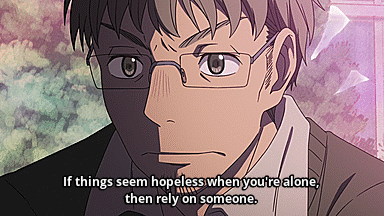
Best Overall: 3-gatsu no Lion/ March Comes in like a Lion
Into the light.
With consistent quality during the second part despite a shift in focus, perfectly managed tone that never leads to excess sentimentality or overt levity, and a story that ebbs and flows with such grace that it melts metaphor and direct description like an impressionist painting, Chica Umino's March Comes in Like a Lion remains the top spot for two consecutive seasons for the simple reason that it tells a rich story of individuals and making meaning.
In the first part, it introduces shogi professional, sometimes student, and introvert Rei Kiriyama and the facets of his life, particularly his close ties with the Kawamoto siblings. At the beginning of Part 2, Rei hugs the youngest Kawamoto sibling, Momo, and says that he has personal and professional matters to deal. While he sees the Kawamoto family as comfort and healing, he understands that he can't come running to them each time. With a major tournament upcoming he stops visiting them and the narrative shifts to the lives of the Shogi players that he plays against. With their own dreams and regrets, he becomes an observer of their lives as he compares it against his own, not to pass judgement on his failings, but to see the possibilities there is to life and to recognize that in the end, there are no bad guys, just people driven by very different motivations and showing how they cope with the consequences of a lifetime of choices.
With another season later in the year and a two-part live action movie currently showing in Japan, the series deserves all the accolades it gets. And if you're ever in the market for something substantial, with a deep, beating heart, this is your anime.

Best Drama: Youjo Senki, The Saga of Tanya the Evil
What is a god to an non-believer?
Tanya von Degurechaff is the fiercest, deadliest, and most cunning soldier of the Empire (Not-Germany) as they wage the first World War (Until it becomes muddled when they introduce a Panzerkampfwagen IV.). She's also under thirteen years old and is hated by God, or a god.
Why is that?
The god sees Tanya has such little faith in him and has therefore cursed her: Should she die a death that is not natural, she will be taken off the wheel of reincarnation and sent to hell.
But why a kid? And why so much hatred for an individual?
While these questions are answered to an extent, the most important thing to consider is that these driving forces are what sets up Tanya as she is placed in conflict for most of the war as she struggles to survive. She puts in as many legal means as possible to leave the war, only to have her end up on the front lines anyway, whether by her own fault, or by divine intervention.
As she leaves a trail of bodies, her actions reverberate throughout the war as everyone slowly pushes down into a black hole, no matter who is winning. And as with the nature of war, there are no heroes, only murderers.
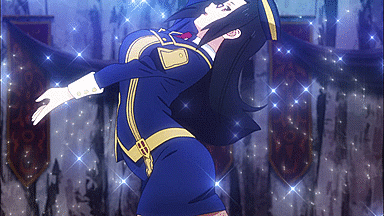
Best Comedy: Kono Subarashii Sekai ni Shukufuku o!
"This anime is like every insane D&D story I have ever heard." -henlp
The second season of Konosuba! continues the adventures of Satou Kazuma as he is pulled from the real world into a fantasy world where RPG game mechanics exist in reality. He's accompanied by a Goddess who drinks too much and wastes her skill points on party tricks, a Wizard who knows only one spell (and collapses after every use), and a Crusader who can tank, but cannot hit any living thing with her sword (not out of principle, she just can't hit at all). Also, that Crusader is a masochist.
"Insane and crazy" is the proper descriptor for the way the series is plotted, as comedic plot points are introduced and escalated versions of those plot points are put to use later on. The characters are made aware that they are in the mess they are in because of the solution that resolved a previous conflict made ample fuel for another. "It gets worse" is another descriptor as they are battered by bad luck and only somehow manage to escape as even their most competent moments are displays of excellence borne out of their utter stupidity. It's a show that's shameless enough to throw everything at a wall to make you laugh, and most of the time, what they throw in, sticks.
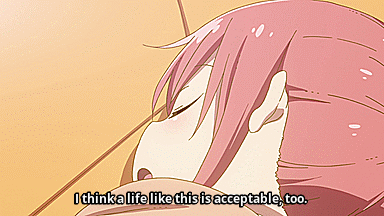
Honorable Mention: Kobayashi-san Chi no Maid Dragon
The Lion falls in love with the Mouse.
Miss Kobayashi is a Systems Engineer who, after a night of drunken revelry, somehow saves the life of a dragon, Tohru. Still drunk, she invites the Dragon back to her apartment, and into her life.
Unlike Konosuba! which fills narrative space with ever increasing, crazy humor, Miss Kobayashi's strength is mixing in the fantastical elements with the mundane, to create the comedy or the heart-warming plots, something that Gabriel DropOut only marginally succeeded in doing.
All throughout are discussions on the comfort between partners and the lives of people from vastly different backgrounds. It's about love and growing into it, even though we've largely been on autopilot. It's about the surprise we get when we realize to what degree people can love us for.
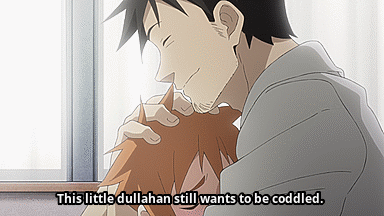
Best Cute Girl Anime: Demi-chan wa Kataritai, Interview with Monster Girls
Science, Folklore, and Free Hugs
Almost all Cute Girl Anime narratives occur within a casting closed system, that is, primary and secondary characters are all girls and they play off their antics onto each other and whatever conflict they find themselves in. So this is a very special case where the Primary female characters shine in their characterization with the aid of a Primary male character, Takahashi Tetsuo, Biology teacher, Demi-Human Researcher, and member of the pantheon of the "Greatest Teachers in Fiction".
So for the girls, we have Takanashi Hikari, vampire, Machi Kyouko, dullahan, Elsa, Kusakabi Yuki, a snow woman, and Satou Sakie, succubus and Math teacher.
The daily motions of these monster girls is already interesting enough, but a subtle beauty comes from the setting and the way the plot is crafted with a keen eye for science and human foibles.
The world-building is present but hardly emphasized, and shows how the world accommodates the Demi-Humans and their special needs. Vampires get blood packs subsidized by the government, Succubi get visits from Demi-Human agencies to check up on how well they're adjusting to their environment, and the rest are treated not so much because they're demi-humans, but how they are as people. Kusakabe Yuki, for instance, is seen as cold by a few of her peers, but never attribute her nature as a snow woman to be the cause.
The science part is interesting, because several chapters detail efforts by Takahashi trying to explain the physiology of the Demi-Humans, drawing on folklore for insight and the scientific method to explain "how" they function, without asking "why". In Magical Realism, whys have never been the point anyway.
And so we have a Cute Girl anime that stands above and beyond what is generally expected of the genre. By having the willingness to introduce other characters in the mix, we experience something a bit more different in how humor is constructed and how conflict is resolved. True to its efforts to ground itself through science, the warmth comes off even more genuine and realistic.
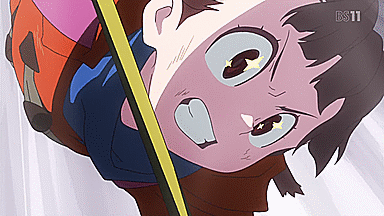
Best Sci-Fi/ Fantasy: Little Witch Academia
Better than Harry Potter.
What started off as a crowd-funded film about a young girl aspring to become a great witch, has turned into a full-blown series as it should have from the start. It carries with it all the trademarks of Trigger: Stark and clean character design, slick animation, and a wild ride of a story. Whereas previous works were about killer clothes and literal shared experiences, this one is a straight-forward romp into the realm of fantasy.
Except, while the premise is straight-forward, the execution has all the majesty and scope of an epic tightly-knit inside the trappings of what is essentially a coming-of-age, high school story. Add a pinch of the ever classic industry versus magic trope, excellent characters and well-realized relationships, and you have something that only ever appears plain and overdone.
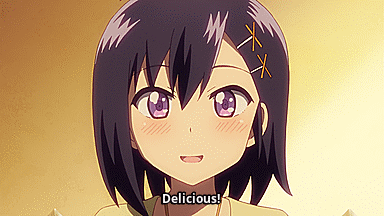
Best Girl: Tsukinose Vignette April from Gabriel DropOut
No good or evil, only kawaii.
I have reached the conclusion that in the world of Gabriel DropOut, the one reason neither Heaven nor Hell have made any greater stride against the other is not because of balance, but rather because both are equally inept.
That being said, Tsukinose Vignette April, a demon from Hell, is the worst kind of inept but the also the best kind of character to be best girl: Kind, disciplined, being the one person responsible enough to go over to Gabriel's home to wake her up for school, scared of horror movies, and just... angelic. Compound her difficulty with being the only straight man in a comedy quartet gives her the patience of a saint.
Some people, like Gabriel, could never grasp the responsibility of being a divine being. For Vignette, she was just unlucky enough to not have been born to a role she's a natural in: that of a normal human being.

Best OP: "Shadow and Truth" by ONE III NOTES from ACCA: 13-Territory Inspection Dept.
"It's never really what it seems."
In the latest of slice-of-life/ food/ mystery anime is ACCA: 13-Territory Inspection Dept, where Otus tries to do his job as inspector in what is ostensibly a Fascist state that is under rumors of a coup.
Of course, the general goal of any good OP is to draw the viewer into the show and communicate what they'll come to expect from it. And for a show with such style and class it's masterful to pick a song that blends hip-hop and jazz as the vocalists rap about the hazy nature of truth as people play games with relationships and politics into each other.
The striking visuals complement the song nicely, with shots of the various characters shifting in and out of blur and limiting visuals to white, black, and one more color for every scene to evoke a unique feel for every single character and teasing the role they'll play in the show.

Best ED: "Los! Los! Los!" by Aoi Yūki from Youjo Senki, Saga of Tanya the Evil
Bedenke, dass du sterben musst.
An ode to madness and bloodlust, Los! Los! Los! (German for "Come on! Come on! Come on!") is a war speech in song form with very simple visuals: Shots of Tanya's face in various states of anger/ madness, a battlefield, and a few illustrations by the Light Novel's artist, Neichiru. How and when they're shown is where the song melds and gains greater power.
The angry/ mad face and the battlefield are shown and interchange with each other to follow the beat of the song during the chorus, which are commands in German to attack, take cover, or stand in attention.
Neichiru's illustrations take over during the verses, which celebrates war, the joys of taking away life, and surrendering your own life to your country, which the song sees as a great achievement, good enough to reach heaven for by building dead bodies one atop another.
Listening to the full song is recommended , as it expands on the nihilism even further, calling for those who advocate peace as weaklings and calling for ceaseless violence and depravity akin more to Heaven rather than Hell.
For its dark and horrifying thesis (sung with the voice of a young girl), the song would not be out of place in a battlefield setting where you know there is no way out, so you might as well go and fight and relish every drop of blood spilled, whether your own, or your opponents.
#March Comes in Like a Lion#youjo senki#konosuba#miss kobayashi's dragon maid#demi-chan wa kataritai#acca 13-ku kansatsu-ka#gabriel dropout#little witch academia#anime awards
195 notes
·
View notes
Text
“But what about.”
A tale of liberal elitist assholery, what-about-isms, and people just generally failing to ever be satisfied by the internet or each other. Ever.
The roof, the roof, the roof is on fire. We don’t need no water let the motherfucker burn.
At least, if they’re being honest, that’s what a lot of liberals would be saying regarding the recent burning of la Cathedrale de Notre Dame in Paris. Instead, they’re going with a refrain that’s old and familiar among more socially liberal subsets of the online community whenever something that they deem “unimportant” or “less than” is damaged, destroyed, or otherwise harmed.
What-About-Isms! (Weird, because we’re so fucking good at calling out conservatives when they “what-about-ism” us… huh… funny how that works…)
“How are people donating money to this problem when there’s a war in Syria and a famine in Yemen?”
“So glad how many tourists a place gets makes it more important than war, famine, or poverty.”
“If the billionaires can fix this problem, why can’t they fix world hunger? The economic inequality in the world?”
“Really? Flint still doesn’t have drinking water and this is what people are spending their money on?”
And so on. And on. And on. But not really, because liberal what-about-isms are exactly as creative as conservative ones, which means they’re really all just a variation of those four. Come on, guys. If we’re gonna dicks, too, we should at least be more creative at it.
While I have a read a couple of elegant albeit clearly privileged rants, most of the complaints, memes, and crappy cartoons are being drawn by normal, though well-educated, liberal folks who think they mean well.
You’re not doing “well.” You sound like a bunch of educated, elitist, assholes telling the rest of America (and the world, since many of y’all are lecturing billionaires in France now) what should or should not be important to them, what is or is not worth spending money on, and what individual people should or should not be sad about. You’re also, effectively, telling people what news they should be consuming and what media they should be watching. Which means, not even inadvertently, you’re telling people how they should spend their spare time and, often, their spare change. I’m a librarian and I don’t even pull that shit, because intellectual freedom is sort of important and coercive learning isn’t a particularly useful educational tool.
Just stop. No seriously. Stop. You’re not helping your cause. You’re not making people more interested in Syria, or Libya, or Lebanon, or Palestine, or Israel, or the Philippines, or the south of Thailand, or Myanmar, or Russia, or Kenya, or South Africa, or Ukraine, or, or, or. See, I can play that game, too. I bet that some of my uber liberal, supposedly well-read friends, can’t tell you what’s going on in some of those countries. What about Guatemala? El Salvador? Ecuador? Mexico, Puerto Rico, Italy, France (aside from their Cathedral), the UK, Northern Ireland specifically, India, Kashmir, Pakistan, or Iraq? Who are the Kurds? Where are the Kurds? What are they up to right now? Are you bored yet? Do you know about the famines in Sudan, Nigeria, and Somalia, or only the one in Yemen? Are you tired of being told how ill-informed you are? Do you feel foolish for not knowing what’s going on in every single one of those countries?
Don’t. Don’t feel foolish. You’re human. No human can, or should, know every bad thing that is going on everywhere in the world. It’s not feasible and it’s emotionally exhausting. Those are just the countries I’ve read about in the news during the course of the last six months or so. Some are at war. Some are experiencing internal strife. Some are committing genocide or something that resembles it. Many are just in the midst of famine or suffering poverty so extreme it makes the homelessness crisis in America look non-existent. I am sure there are hundreds of issues the world over besides just these, and I’m sure many of them are as severe or more than the ones I’ve mentioned above. Which means, in many ways, the what-about-isms surrounding the burning of a Cathedral aren’t just elitist, they’re hypocritical.
“How are people donating to this when there’s a war in Syria and a famine in Yemen?”
Okay, but there’s also wars going on in Iraq and Afghanistan. There are basically perpetual incursions in the Kashmir region between Pakistan and India. There are effectively genocides going on in various countries in Africa. Depending on how Brexit breaks, violence may well break out in Northern Ireland, again. Russia is occupying parts of Ukraine, still. Venezuela is in such a great state of upheaval, other countries are considering intervention. At least three nations in Africa are in the midst of a horrible famine. Hell, our own state of California just crawled out of a drought that it had been in for years. A drought that led to wildfires that caused the destruction of thousands of homes, many of which still haven’t been rebuilt and likely won’t be rebuilt for decades. And absolutely none of that will matter if we don’t stop climate change and save the fucking bees. But your focus is Syria and Yemen specifically? What makes them important? Why are they special? And why should they be more important and more special than every other conflict or food-oriented crisis on the planet? I can most definitely what-about-ism your what-about-ism until the cows come home, because there’s almost certainly something horrible going on somewhere else that I can toss in your face as being just as important as your bullshit what-about-ism.
“So glad how many tourists a place gets makes it more important than war or famine.”
Not necessarily more important, just more well known. When we threw 59 missiles at an airbase in Syria, it made the front page of one of the newspapers sitting behind the reference desk where I work. Sure, it was in the local newspaper, but it wasn’t deemed interesting enough for front page news. Notre Dame burned and it was on the front page of every fucking paper on the planet the next day. Hell, it’s on the front page of all four papers sitting behind my reference desk today. Three out of four them it is, for the second day, the obvious front page story. Why? Because people know what and where that Cathedral is. Seeing a story about a recognizable object or place is going to make someone pick up the newspaper and read it. Media centers know that, and they plan their layouts accordingly. People will only know about the items and entities that are placed before them for their intellectual consumption. A place having a lot of tourists doesn’t make it inherently more important, but it does make it inherently more well-known, and thus a better story.
Before anyone says “seek out better news sources,” it’s worth considering the fact that better news sources require both access and time. These are not two commodities that everyone has. Money, or a local library, are necessary to make access to things like the New York Times or the Washington Post possible. Things like NPR, the BBC, and PBS are all free access, but they still require broadband or wireless access, via internet or a data plan. The number of people without ready access to the digital world is literally unknown in this country, because it’s not a question that’s ever been asked on a census and the few times the government has tried to do a conclusive count it’s come up stymied. Assuming that the entire country has ready access to any news they want at the touch of a finger is an intensely privileged assumption to make. Don’t believe me? Work a library reference desk for a day and count how many people call for phone numbers because they lack a means by which to look them up. Then tell me again that ready, and immediate, access to “acceptable” news sources is something they’re probably overly concerned about.
Even for those with ready internet access, financial means, or access to a library, time is still a constraint. We can only consume so much media in a day. We can only fit so much, full stop, in a single day. I know more about what’s up than most people, because I work a job that allows me to read the news while at work. One of my many tasks is literally clipping relevant news articles from the local paper so I am, in effect, paid to stay “in the know.” How are we going to tell a single mother who works insane hours that, after she’s finally gotten her kids to bed, she should be reading up on the crisis in Syria rather than catching up with her friends on Facebook? Her life is not abnormal, which means her lack of insight into the world, existing not because of a lack of caring but because of a lack of time, is not abnormal. How are we going to tell the couple with sick parents and an overdue mortgage that their concern for a Cathedral, the one piece of news they were able to catch up on in between hospice visits and work, speaks to their character?
The fact that so many people are so concerned about a damned church is not cause for alarm, it’s actually cause for a sigh of relief. It means people haven’t completely tuned out. It means people are, in fact, paying attention to what’s going on in other parts of the world. Even people who genuinely lack the time or money to dedicate to “adequate” intellectual pursuits are still, on occasion, tuning in to the rest of the world. Do not discourage that with your snarky elitist “you’re paying attention to the wrong things” bullshit.
“If the billionaires can fix this problem, why can’t they fix world hunger? The economic inequality in the world?”
First, how do you know what the billionaires are spending their money on? Do you disclose everything you spend your money on? Am I allowed to start approving your philanthropic pursuits and telling you what you can/should donate to? Bill and Melinda Gates all but single-handedly (or rather, single-walletedly) eliminated certain diseases via vaccinations. Oprah is educating young girls in multiple countries. Elon Musk is trying to get us to Mars, for fucks sake. Billionaires, like all humans, are capable of super shitty things. They’re also capable of super awesome things. They’re not capable of fixing all of the problems in the world and, honestly, they shouldn’t be expected to. While billionaires in the United States rarely pay their “fair share” of taxes, those in other countries often do. Which means that the billionaires in France who have pledged (read: started a fierce and ridiculous competition, but whatever) to help rebuild the Cathedral have likely already donated to the French coiffeurs and are now doing what they consider to be “their part” (read: are now competing to prove they’re the best rich Frenchman of them all) to help ensure the government doesn’t have to rebuild a national monument. Because that’s what Notre Dame is.
While it may hold Catholic services, it’s not owned by the Catholic church. Which means the church is, in no way, required to repair it. If France wants to guarantee its maintenance for future generations, it’s not something that can be left to the church. A couple of billionaires are making sure the dent it puts in the available tax base is relatively minimal, even if that’s not necessarily their intent. You don’t have to commend them for it, but I’d recommend not lambasting them for it, since the Cathedral is getting fixed one way or another. The more billionaires “waste” their money on it, the less tax payers will feel it.
But “why” is it getting fixed? Why does it matter? Why can’t they spend the money on something else? It was started in the 1100s. It is one of the oldest, largest, standing examples of French Gothic architecture in the world. Some of the most important events in French history have happened in or at that Cathedral. History is important, as liberals who call for reparations are well aware. Those who do not remember their history are doomed to repeat it, as liberals who scream that we should be punching Nazis cannot have forgotten. There is essentially nothing in our country so important to us, so fundamental to the fabric of our being as a nation, that we would be willing to dedicate millions of dollars to repairing it if it was damaged. Part of this is that we’re a very new nation still. Part of this is that much of our history is tarnished, some horribly so. Much of this is that America, for all its “pride,” lacks an overarching sense of identity.
We are, and have for some time been, quite fractured. By politics, by religion, by skin tone, by the fact that we have always been an imperialist melting pot founded upon a land that we stole from another people. There are few structures or places in this country that hold a significance large enough to all of us that they would be overwhelmingly viewed as worth saving. While France is seeing some internal strife, they are a nation that largely possesses a sense of identity. I can’t really tell you what it means to be American, and I am one. Fuck, I wore our uniform for eight years and I still can’t really tell you what it means to be American. I have never met a French person who couldn’t tell you what it means to be French. That Cathedral lies at the heart of their capital city and, in many ways, at the heart of their nation. The French people would never allow it lie fallow and turn to dust, and it’s pretty deplorable that a country of people who all but lack a unified identity think we have the cultural savvy to dictate to another nation what should become of a structure that is four times older than our entire being. We cannot comprehend why the French would pay millions to fix a church that old, in part because we literally cannot comprehend what it means to have a national history that old. If we could, the donations of billionaires would probably make a lot more sense to us.
“Really? Flint still doesn’t have drinking water and this is what people are spending their money on?”
I live in Cleveland. The lead levels in certain neighborhoods in my city are exponentially higher than those in Flint. If you’re using Flint as an excuse to avoid spending money on other things, you’re showing your own bias and overall lack of knowledge on a topic that is much bigger than the buzzword you’ve turned the city of Flint into. My city is not the only one like this, either. There are dozens (probably hundreds) of cities in this country that have lead levels higher than those in Flint. We just don’t have an exceptionally annoying movie producer named Michael Moore capable of throwing an international temper tantrum about the situation. I’m thrilled that he got the attention that he did and that he forced Flint’s officials to at least admit wrong doing, even if they still haven’t fixed the problem. Pretending that the water in Flint is as bad as it gets, though, is seriously disingenuous and shows just how thoroughly even some of the most obnoxious elitists don’t understand their own talking points. Come on guys. Do your research.
In the end, telling people what they can be upset about isn’t just bad politics, it’s bad interpersonal dialogue. It presumes that the person you’re talking to is incapable of considering multiple major world issues as important at the same time. It presumes that the person you’re accusing of not caring “properly” has access to the same time and resources that you do, and presumes that your own personal international interests are the most important ones out there. Yes, the war in Syria is important. So is the famine in Yemen. But so are five million other things going on right now, and you are not the arbiter of that which is “most” important.
There will come a day when something big, and important, will happen to you. Maybe it’ll be a car accident. Maybe it’ll be a birth. Maybe it’ll be a deployment. Maybe it’ll be an explosion that leaves half a city block leveled. It will be the center point of your existence for as long as you need it to be. Maybe people from outside of your town will care, maybe they won’t. That doesn’t matter, though, because the event in question is important to you. Now imagine how disheartening it would be if you got online and hundreds of thousands of people were discussing the fact that whatever happened in your corner of the planet was irrelevant because of all the other things happening in other parts of the planet. Just as we went back to ignoring Syria a couple weeks after each bombing run, just as we’ve long since forgotten that the war in Iraq ever even happened or that the one in Afghanistan is still on-going, just as we’ve forgotten that Puerto Rico is still rebuilding and that Venezuela is still falling apart, in a couple of weeks we will forget about Notre Dame. And then each of us, as individuals, will be free to go back to our separate corners of the internet and focus on the things that we find important.
Until then, calm down. Get off the net if you have to. Liberals have enough problems without a subsection of our own deciding they’re solely and singularly qualified to determine what major world events are actually worth talking about and giving money to. You don’t know everything. None of us do. So how about if we just don’t act like a bunch of elitist dicks and let people care about whatever the hell they want to care about.
Including the fact that the stain glass windows survived that fucking fire. Props to 13th century artisans.
0 notes